Topic: The Current State of International Criminal Law and the Necessity For An International Anti-Corruption Court
Date: 17th July 2020
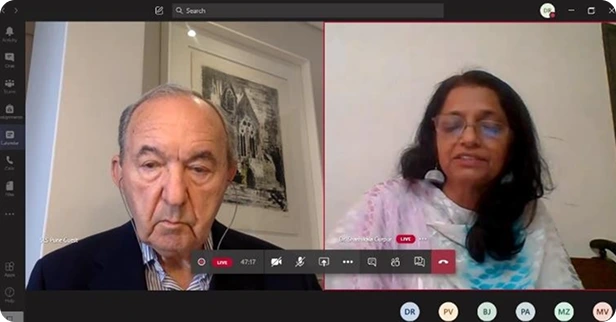
Justice (Retd.) Richard Goldstone, Former Justice, South AfricanConstitutional Court commenced the lecture by introducing to the viewers the series of events that led to the development of international criminal law. He stated that priorto the Nuremberg trials, the modern-day concept of statutory International Criminal Law wasstill evolving, as international law existed mostly only in terms of governance but not criminalliability; apart from the Geneva Convention of 1949, which laid down basic principles ofcriminal liability but remained at a rudimentary stage of evolution. He elaborated on the processof formation of the International Criminal Court through the Rome Statute of 1998 and theAssembly of States Parties, the governing body of the ICC. Justice Goldstone then went on todiscuss with the students, the various principles that guide the functioning of the InternationalCriminal Court, illustrating their application in different cases adjudicated by the ICC. He alsospoke about the difficulties in the functioning of the court because of the non-membership ofIndia, USA, China, and Russia and spoke of a desire to see these nations enter the jurisdictionof the ICC.
Justice Goldstone thereafter shifted the focus of the lecture to the issue of ‘Grand Corruption,’also known as “kleptocracy” and brought to light his reasons for supporting and recommendingthe formation of an International Anti-Corruption Court, a proposal which has received widespread approval from the international community. In laying down the details of thestructure and principles of the proposed Court, Justice Goldstone stated that the establishmentof such a body is a necessary step towards policing and dealing with crimes of corruption. Healso highlighted the relevance of discussing the same on the 17th of July, it being the WorldDay of International Justice.

Topic: Reflections on a Career / Life in Law and the Judiciary
Date: 29th July 2020
Justice John Hedigan has been a judge of theIrish Court of Appeal since September 2016.Prior to his appointment, he was a judge of the Irish High Court from April 2007. On 20 th July2016, he was nominated by the Government of Ireland for appointment by the President ofIreland to the Court of Appeal.
Despite the devastating impacts of COVID-19, Justice Hedigan was able to address an audienceof over 350 students from various batches, as well as faculty members; an opportunity whichmay not have been afforded to us during our regular academic year. Justice John Hedigan hasbeen a Judge of the Irish Court of Appeal since September 2016. He eloquently described therealities of a career in the Law and the Judiciary. He discussed the role of Ireland in theEuropean Union’s Human Right Laws, and the drafting process the laws underwent before theywere finalized. Moreover, an overview of the more recent cases brought before the EuropeanCourt of Human Rights was also given. On the question of the relationship between India andIreland, Justice Hedigan showcased how Ireland contributed to kick-starting Human RightsLaw in the European Union and how India and Ireland share close links and history when itcomes to the struggle against colonialism. The principles under the Directive Principles of StatePolicy in the Indian Constitution were also acknowledged to have been borrowed from the IrishConstitution of 1937.
Topic: Civil Procedure during COVID-19 Times and Constitutional Principles
Date: 12th August 2020

Justice Fiecconi, , Judge, Supreme Court ofItaly, began her lecture by highlighting that theConstitution is the main source of the law,especially in times of crises. A tool for power, restraint and enforcement of rights, she spokeof 5 essential pillars that determine whether a Constitution is an effective one. Going on toelaborate on each pillar in greater detail, Justice Fiecconi highlighted examples of how theIndian Constitution fits the bill and how the text of Constitution cannot be betrayed by theformal powers of the State. With respect to the COVID-19 pandemic, Justice Fiecconi spokeabout how these circumstances test the efficacy of international establishments geared towardsthe protection of human rights. All the factors pose a risk of government supremacy overwelfare and also put a greater responsibility on courts of law to improve the access to justice.
An example of this is the European Commission forthe Efficiency of Justice (CEPEJ) of the Council ofEurope, which ensures the efficiency and quality ofjudicial systems. Additionally, she spoke about theissues of cybersecurity of personal data as wecontinue to settle into the idea of digital justice andemphasized on the need for IT support requires theguarantee of security, extra training and ensuring that access to technology is available at alllevels of the justice system.
Topic: The Principles of Environmental Rule of Law and how Courts have applied them.
Date: 17th August 2020
Justice Emmanuel Ugirashebuja, President, East African Court of Justice, Tanzania, set thepremise of his lecture by establishing the transgression of planetary boundaries being causedby the human race. According to him, understanding urgency of the matter is of the utmost importance as is seen through tangible proof such as the Carbon Dioxide levels in theatmosphere exceeding 350 ppm, the large-scale biodiversity and forest cover loss and theincreasing global temperatures. Considering these dire circumstances, he says that heconstantly finds himself asking the question, “What can judges do to positively impacthumanity’s life support systems?”. According to him, it is imperative that judges abide by theprinciples of Rule of Law and cited 8 ingredients to be able to make this happen. He spokeabout the need for Constitutional guarantees of environmental protection in every country andelaborated on the similarity in constitutional judgements of the Indian Supreme Court and theAfrican Court of Human Rights, both having recognised the right to clean environment as aFundamental Right.
On jurisdictional issues, he spoke about the doctrine of forum non conveniensandgave theexample of the Bhopal Gas Tragedy and the Southern District Court of New York State whichdid not admit a suit against Union Carbide Company. He also spoke about the Kafue riverdispute and the interpretation of the European Court of Justice which waived the doctrine andallowed a British company to be sued in UK courts despite the origin of the suit being outsidethe territory of the UK. Justice Emmanuel concluded by bringing forth the need forinternationalization of judicial integration to reinforce the environmental rule of law and thenecessity to do away with the problematic aspects of judicial proceedings causing a detrimentto the environment. He called for the newer generations of students and the legal fraternity totake on the responsibility of improving environmental jurisprudence.
Having recognised a variety of challenges pertaining to Migration in the European and Asiancontinents and in order to overcome such challenges and problems in the Partner countries ofMyanmar and Malaysia, and fill in the knowledge, legal and political gap in the forcedmigration issue, the ILFM project proposed to conduct a comprehensive research in the areaand develop an innovative and intellectually challenging Master programme in internationallaw and forced migration issues that is absent from the Partner Countries HEIs programmes.The objective of this initiative is to carry out a more in-depth analysis composed by means ofdesk research and interviews to identify and analyse existing HEI LL.M programmes in Europeand Asia in similar areas of International Refugee Law, the International framework for theprotection of Human rights law, law of the sea and its relevance to Migration, clinical lawyeringand advocacy trainings as well as investigate the needs of the academic staff in order to upgradetheir skills to be able to face the challenges of the 21 st century.
Student members of the International Cell, under the guidance of the faculty members,undertook the task of research and compilation of experts, existing courses in universities inIndia and around the globe and collated all such data into determining the gaps in each courseto best develop a programme that would address all these challenges. A dedicated student-faculty team starting from October worked over a course of almost six months in the academicsessions to formulate the list of national and international experts and submit to them theprepared questionnaires to understand the contemporary needs which the programme will needto address. The project is a work in progress and is aimed at being culminated in the creationof Masters level programme dealing with all the issues brought forth.

Topic: Should Social Media Algorithms be regulated?
Date: 6th November 2020
The first deliberation forum presentedby International Cell, ILSA PuneChapter was kick started with theintroduction of Dharminder SinghKaleka as the keynote speaker. In his address, Mr. Dharminder Kaleka highlighted some keyissues of discussion regarding the influence of social media on politics giving examples fromdaily life. Social media is embedded in our daily livelihood, right from household to politics toworld affairs. It is not a lesser-known fact that people have become more engrained in the socialmedia influence, knowingly and unknowingly. During the beginning, social media were onlya platform where people shared their opinion about ongoing issues. As time progressed, ittransformed from being an open platform to a systematically run algorithm mainly to earnrevenue. The personalizing of content has become so normalized in recent years that requiredstrict regulations. Politics primarily gets influenced by social media when only one side of thestory is reflected. In the whole process of expressing, one’s opinions about an issue, peopletend to lose a touch of balancing. The other side of the opinion is neglected without framingone’s opinion. In the past 7-8 years, there has been a substantial boom in social media usage.This is a result of falling prices of smartphones and data packs. Even the common masses areable to afford smartphones and data packs. The very down- trodden sectors of country are alsoable to use social media. However, there is a major lack of education in the strata because ofwhich the opinions formed by them are not accurate or well- thought.
The forum began with the speaker talking about her personal experience with the Instagramexplore page showing exactly what they wish to see, pointing towards the way in which thesecontent personalization algorithms work. The three main things, i.e., technology, entertainmentand algorithms work in consonance to make the personalization work. The best way to regulatesuch algorithms is to legislate on such topics. The suggestion of placing a limit on the numberof user targeted content posts was put forth. We as consumers of social media, should startbeing more cautious about these forces and filter our searches. NETZG Law in Germany forinstance proved to be a most ambitious attempt to regulate platform contents moderationprocesses in Europe. Other speakers pointed out a relationship between Politics, ContentRegulation and Generalization which mainly impact the personalized content on social mediaplatforms.Possible outcomes arrived at the end of discussion:
Topic: China's growing influence: Another dimension to the “New Normal”.
Date: 5th December 2020
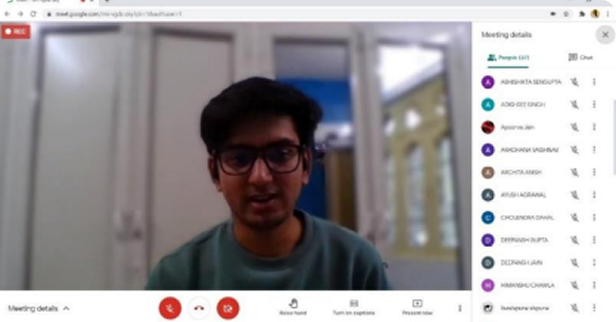
Taresh Bakshi was the resourceperson for the second session of theDeliberation Forum. He provided ahighly informative outline for thediscussion, talking about the aimbehind bringing the phrases ‘China’and the ‘New Normal’ in the sametopic. He brought out some important themes within the topic, such as China’s new foreignpolicy in relation to soft power, it’s growing strength as an economic force internationally andthe manner in which China dealt with the COVID-19 pandemic and the associated backlashagainst it.
With these insights into the topic, the floor was opened for discussion. The debate started outwith an exchange of views on debt-trap diplomacy as a tactic employed by China. While somemembers of the Forum condemned China’s tactics, others found it an unfair condemnation.Prof. Kshitij Naikade also participated in the discussion and drew the participant’s attention tothe growing influence China exerts over not just Asian politics but international politics.Further discussion was had on the same vein, with some speakers bringing out the cognizanceof other countries in allowing China to take adominant position in international politics andtrade. Participants drew light to how China’sinvolvement in international trade andproviding loans to developing countries wasalso to the benefit of those very countries.
Participants then discussed how China insulated itself from the presumably harsh criticism it could have received over the concealment of the severity of the COVID-19 pandemic. The exercise of soft power through a show of charisma is what the participants agreed largely insulated the country. The well-spun narrative of efficiency in dealing with the crisis and providing aid to other countries struggling with the virus played a part in preventing extreme reactions to China over the pandemic.
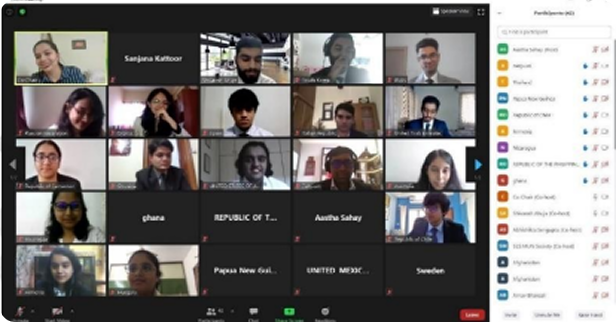
The Intra MUN 2020 conducted on 12 th November 2020 attracted registrations from over 50 students at the college who were each allotted a country to represent as part of the simulation of the United Nations General Assembly (UNGA). The Executive Board comprised of Shivansh Ahuja and Nimisha Shukla who presided over the assembly. The agenda set for the day was “ The question of BigTech regulation and data security across boundaries.” The Intra-MUN was conducted virtually, through the online platform Zoom.
Over the cross of the entire day, the delegates discussed and deliberated upon the various aspects of the agenda and took up the discussion to a solution-based approach showcasing their critical analysis skills and research in addressing the nuances of the agenda. The delegates functioned as per the procedure told to them in the orientation session conducted for them before the registration process began.
Based on the performances of the day, the delegates were scored as per their foreign policy, research and participation in discussion among other things and a tier-based structure was formulated on the basis of which contingents were made for the various conferences in the academic session.
The Southeastern United Nexus Model United Nations (Online) 2020 was hosted on the 19 th and 20 th of December 2020 for the purpose of raising funds to purchase resources for the patients and staff of the COVID ward of the National Children’s Hospital in Philippines and had the following committees to offer:
The Cell sent a five member delegation to participate from which Shreyans Parakh won Honourable Mention in UNHCR and Ishmeet Kaur Saluja won Verbal Mention in UNCND.
The SLS, Hyderabad MUN 2021 was hosted on 20 th and 21 st March 2021 online via the Zoom Platform. The committees simulated at the conference were, UNSC with the agenda: Review the Current Legal Framework for Deployment of Peacekeeping Operations; UNHRC with the agenda: Deliberation on the Shortcomings of the IHL and ICRC in Safeguarding the Rights of Civilians and POWs During War Crimes; the All India Political Parties Meet with the agenda: Reassessment of the Presence of Different Pressure Groups in India and Assessing the Effects on Elections; and a Continuous Crisis Committee where the delegates got to deal and solve new crises as they arise and work together as new directives from the Board force you to adopt.
A contingent of eight first years from the college participated in the conference and displayed commendable performances with Rohan Gupta winning the Special Mention in the AIPPM.
The PCGT National Youth Parliament was conducted on 10 th and 11 th April 2021 was organised by the Public Concern for Governance Trust (PCGT) in association with the Pravin Gandhi College of Law (PGCL) via the Zoom platform. The theme for this edition was the “Era of Reforms” and the conference simulated the following:
An eight member delegation was sent for this Conference, of whom Nikhilesh Koundinya was awarded the High Commendation, Gaurangi Pande was awarded the Special Mention and Jayati Bhatia was awarded the Verbal Mention in the Rajya Sabha.
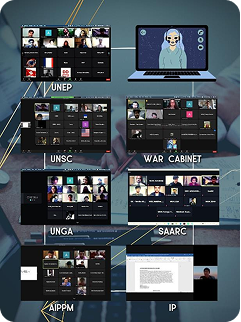
With the agenda for United Nations Security Council being “Assessing the Possibility and Causality of the Spread of Coronavirus as a Man-Made Biological Weapon”, the delegates released questions and discussed possible solutions about the potential deliberate use of COVID-19 as a biological weapon. The agenda for United Nations Environment Program was the “Disposal and Adverse Repercussions Of Covid- 19 Generated Biomedical Waste on the Ecosystem”. The overdrive in the healthcare industry has led to a tremendous increase in
An eight member delegation was sent for this Conference, of whom Nikhilesh Koundinya was awarded the High Commendation, Gaurangi Pande was awarded the Special Mention and Jayati Bhatia was awarded the Verbal Mention in the Rajya Sabha biomedical waste generation: the committee deliberated upon the issues and solutions regarding the same.
The All India Political Parties Meet deliberated upon “Formulating Strategies for Ameliorating the Economic Effects of the Covid-19 Pandemic”. The pandemic continues to wreak havoc in the Indian economy and delegates proposed solutions to amend the situation. the Social, Humanitarian and Cultural Committee discussed “Assessing the Ramifications of Pandemic Control Measures on Women and Vulnerable Groups”. By exploring the human rights aspect of the pandemic, the delegates of SOCHUM also brainstormed possible solutions for the same. The unprecedented COVID-19 crisis united the SAARC countries as they adopted measures to deal with the crisis quickly. The delegates explored the matter further by debating on “Adapting Existing Frameworks of Regional Cooperation in South Asia to Tackle the Emerging Challenges of the Covid-19 Pandemic”. At the exhilarating War Cabinet delegates simulated the Second Chechen War – an armed conflict primarily in Chechnya between the Russian Federation and the Chechen Republic of Ichkeria.
Promoting and protecting the freedom of press is what makes a member of the international press and the IP delegates represented the importance of unbiased journalism thoroughly. Over the course of the three days from 28 th April to 30 th April, 2021, the delegated participated enthusiastically and made for a well-founded academic discourse making the conference a huge success.

The EURASIA Distinguished Speaker Program Lecture Series is a series which has evolved out of the IALS Distinguished Speaker Lectures series and aims to function on similar objectives of transparency and open dialogue. Birthed by the International Cell faculty members, the Distinguished Speakers Programme looks at the cultural issues which affect us as a global community and how parallels can be seen and understood across the Indian and European jurisdictions. The Distinguished Speakers Programme encourages and depict a wonderful example of outside-the-classroom-learning emphasised the significance of learning through in-depth understanding of matters of cultural values in any society. The Distinguished Speakers Programme elucidates the profundity of multiculturism, especially now that the world has become a “global village”. Conducted in regular intervals over the course of the academic session, the various speakers invited enlightened the audiences with their understanding and insights into a variety of areas which have been listed down as the following:
With the agenda for United Nations Security Council being “Assessing the Possibility and Causality of the Spread of Coronavirus as a Man-Made Biological Weapon”, the delegates released questions and discussed possible solutions about the potential deliberate use of COVID-19 as a biological weapon. The agenda for United Nations Environment Program was the “Disposal and Adverse Repercussions Of Covid- 19 Generated Biomedical Waste on the Ecosystem”. The overdrive in the healthcare industry has led to a tremendous increase in
An eight member delegation was sent for this Conference, of whom Nikhilesh Koundinya was awarded the High Commendation, Gaurangi Pande was awarded the Special Mention and Jayati Bhatia was awarded the Verbal Mention in the Rajya Sabha.
The All India Political Parties Meet deliberated upon “Formulating Strategies for Ameliorating the Economic Effects of the Covid-19 Pandemic”. The pandemic continues to wreak havoc in the Indian economy and delegates proposed solutions to amend the situation. the Social, Humanitarian and Cultural Committee discussed “Assessing the Ramifications of Pandemic Control Measures on Women and Vulnerable Groups”. By exploring the human rights aspect of the pandemic, the delegates of SOCHUM also brainstormed possible solutions for the same. The unprecedented COVID-19 crisis united the SAARC countries as they adopted measures to deal with the crisis quickly. The delegates explored the matter further by debating on “Adapting Existing Frameworks of Regional Cooperation in South Asia to Tackle the Emerging Challenges of the Covid-19 Pandemic”. At the exhilarating War Cabinet delegates simulated the Second Chechen War – an armed conflict primarily in Chechnya between the Russian Federation and the Chechen Republic of Ichkeria.
Promoting and protecting the freedom of press is what makes a member of the international press and the IP delegates represented the importance of unbiased journalism thoroughly. Over the course of the three days from 28 th April to 30 th April, 2021, the delegated participated enthusiastically and made for a well-founded academic discourse making the conference a huge success.
| Sr. No. | Date | Name of Speaker | Topic Covered |
|---|---|---|---|
| 1 | 20th November 2020 | Dr Daniela Irrera | Crime-Terror Nexus and its Implicationson European Security |
| 2 | 21st November 2020 | Dr. Maria Stoicheva | Norm Creation in EU Law |
| 3 | 27th November 2020 | Dr. Przemyslaw Tacik | Norm Creation in EU Law |
| 4 | 28th November 2020 | Dr. Przemyslaw Tacik | EU and Human Rights |
| 5 | 1st December 2020 | Dr. Lid King | Multiculturalism and Linguistic Identity |
| 6 | 5th December 2020 | Dr. Vihar Georgiev | Exclusive, Shared and SupportingGeorgiev Competences of the European Union |
| 7 | 8th December 2020 | Dr. Natasza Styczyńska | Common Foreign and Security Policy |
| 8 | 11th December 2020 | Dr. Nikolina Tsvetkova | Intercultural Communication and Intercultural Dialogue |
| 9 | 17th December 2020 | Dr. Francesca Longo | Migration and Asylum Policy of the EUbetween Old and New Challenges |
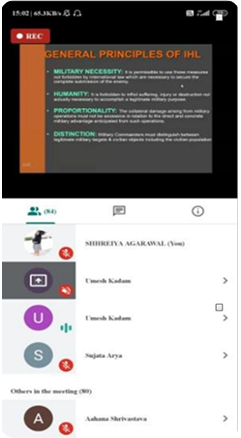
Topic: Brief Overview of International Humanitarian Refugee Law
Date: 11th August 2020
The guest lecture was a brief overview of International Humanitarian Refugee Law wherein Dr. Kadam started by discussing the basic definition of Public International Law, moving unto the modern sources of International law. Before the codification of International Law, customs played an important role. Although they still hold an important role despite the birth of various conventions and laws. The jurisprudence and roots of International and Humanitarian Law was heavily discussed. Dr. Kadam encouraged students to ask compelling questions at the end of the session to prevent any doubts on the discussed topics.
The lecture brilliantly covered all the aspects of modern humanitarian law which is broadly divided in two categories: International armed conflicts and Non- International armed conflicts, although, Dr. Kadam highlighted that International Law shall not apply to internal disturbances, violence and riots and armed conflicts. Dr. Kadam further moved on to explaining the fundamental rules of International Humanitarian laws; the basic rule being, to ensure humane treatment to persons not taking part in hostilities’ and most importantly, to ensure the dignity of captured combatants and civilians and protecting them to prevent them from being killed. Detained persons shall be tried at the earliest to know their participation in insinuating violence. Dr. Kadam also covered and highlighted upon the means and methods of warfare and the principle of proportionality.
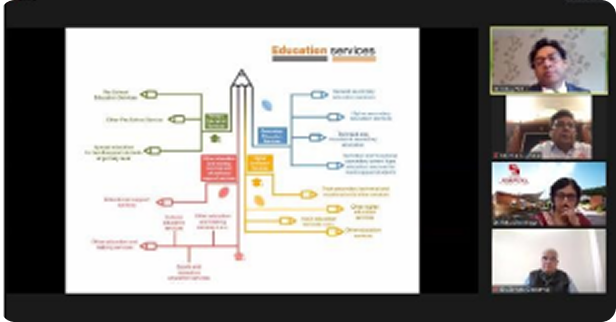
Topic: Aligning India’s Education Sector with Global Practices and Emerging Export Opportunities
Date: 25th August 2020
As an International Cell activity, the students of the International Cell were made to attend a webinar hosted by the Services Council Export (SEPC) Promotion which is an organisation setup by the Ministry of Commerce & Industry, Government of India to investigate the various aspects of service sector export in India. The webinar addressed the imperative concern of internationalization of the education sector which has become a contemporary issue considering the New Education Policy and the general trend towards increased cooperation in light of the Coronavirus pandemic. Organised by the SEPC in association with the Association of Indian Universities (AIU), the event saw a range of experienced panellists specialising in the various aspect of both education and corporate sector export fields.
The session was opened with a brief introduction about the SEPC and its vision. Madam Pro Chancellor, Dr. Vidya Yerawdekar went on to breakdown her role as Pro Chancellor of SIU, which itself was formulated with a wholistic atmosphere keeping in mind the needs of the numerous international students in Pune. The tone of the discussion was set with her comments on the need for the creation of adequate mechanisms for online education considering the pandemic and the various pre-requisites like proper analysis of socio-economic needs of students being targeted as the market for India’s path of export promotion for education. An enlightening culmination of opinions, the webinar covered all aspects of necessity regarding India’s path to internationalization in education and provided a forum for experts in the field to discuss and deliberate upon their initiatives and concerns.
Topic: The relevance of the Principle of Legality and the Promotion of Administrative Justice Act 3 of 2000 in South African Administrative Law: Finding the appropriate pathway to Judicial Review
Date: 10th September 2020
Dr. Henrico, a Senior Lecturer at the Department of Public Law & Jurisprudence Faculty of Law, University of the Western Cape, explained the context of the principle of legality and rule of law, and drew a comparison between the different situations that existed in India and South Africa in the 1940s. While India passed its Constitution in 1949, the National Party in South Africa had adopted the racially discriminatory practice of apartheid in 1948. This practice was in place until the Interim Constitution of 1993. The existence of this practice in South African history has led to a culture of justification in the present. Any exercise of power must be accountable and subject to the culture of justification, and anything less than that would be an impunity of the constitutional values.
Dr. Henrico then proceeded to explain the Constitutional, jurisprudential, and legislative background for the process of judicial review regarding administrative action. He analysed the development of the principle of legality through several landmark cases. He then pointed out the effect of a national legislation known as the Promotion of Administrative Justice Act, 2000 (PAJA) and noted that the legislation has been criticized for its complexity and for the fact that it has excluded several actions that may otherwise be deemed to be administrative actions.
Explaining further, he stated that a result of this is that the Courts have dealt with the matter of judicial review of administrative action in different ways and closed his speech with some practical advice to the students who were attending.
Dr. Radley Henrico also conducted a series of other lectures across batches in the following order:
| Sr. No. | Topic | Class | Date |
|---|---|---|---|
| 1 | The relevance of the principle of legality and the Promotion of Administrative Justice Act 3 of 2000 in South African Administrative Law: Finding the appropriate pathway to judicial review |
3rd Year BA/BBA LLB Course: Administrative Law
3rd Year BA/BBA LLB Course: Administrative Law |
10th September 2020 |
| 2 | The functus officio doctrine and invalid administrative action in South African administrative law: a flexible approach. | 2nd Year BA/BBALLB(Suggested) / 3 rd Year BA/BBA LLB Course: Administrative Law
5 Year BA/BBALLB Comparative Constitution LLM |
14th September 2020 |
| 3 | Understanding the concept of “religion” within the constitutional guarantee of religious freedom |
2nd Year BA/BBALLBConstitutional Law
5 Year BA/BBALLB |
18th September 2020 |
| 4 | The relevance of the principle of legality and the Promotion of Administrative Justice Act 3 of 2000 in South African Administrative Law: Finding the appropriate pathway to judicial review. | LLM | 5th October 2020 |
| 5 | The functus officio doctrine and invalid administrative action in South African administrative law: a flexible approach. | LLM | 16th October 2020 |
Topic:International Criminal Law and Responsibility for International Crimes, particularly in relation to Non-State Actors.
Date: 11th September 2020
Dr. Clare Frances Moran, Lecturer in Law, Edinburgh Napier University, has published widely on the concept of defences in international criminal law and responsibility for international crimes, particularly in relation to non-state actors. The lecture was specially held for the students of International Humanitarian Law and Refugee Law. This was done because of the undeniable importance that the said topic holds in this subject. International Humanitarian Law and Refugee Law apply extensively in cases of International Criminal Liability and must often be dealt with collectively. Thus, holding the guest lecture for the students of International Humanitarian Law and Refugee Law was extremely relevant and added to their knowledge about these subjects. The resource person, having wide knowledge in the field of International Criminal Law, provided important insight into the topic and its relevance in today’s context. Emphasis was laid on the application of legal theory in these areas. The lecture was an important stepping-stone into a deeper and clearer understanding of not only International Law as a whole, but also the specific disciplines of International Humanitarian Law and Refugee Law in the context of International Criminal Law. The virtually held Guest Lecture was a valuable addition to the knowledge of the students, providing an understanding-enhancing opportunity to them.
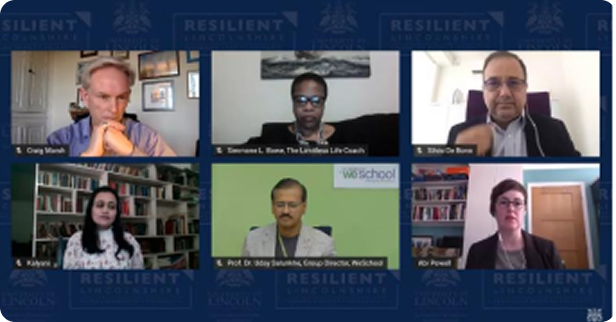
Topic: 21st Century Leadership: Emotional LENS
Date: 12th November 2020
As an International Cell activity, the students of the International Cell were made to attend a webinar hosted under an Initiative of the Lincoln International Business School. The webinar focused on the ‘Emotion Lens’ of leadership to explore the key traits of an emotionally connected leader in VUCA times. It covered concepts such as awakening self-awareness, inclusive leadership, strategic coaching/mentoring for success and accepting our own vulnerability as a sign of inner strength. The panel was chaired by Prof Craig Marsh, Pro-Vice Chancellor and Director of the LIBS and the panel members were:
An eight member delegation was sent for this Conference, of whom Nikhilesh Koundinya was awarded the High Commendation, Gaurangi Pande was awarded the Special Mention and Jayati Bhatia was awarded the Verbal Mention in the Rajya Sabha.
The 9 th edition of the International Annual Research Conference on Rule of Law in Context: Indian and Global Perspectives was held over the span of two days, 12 th, and 13 th March 2021, specially designed to discuss and deliberate on various interdisciplinary areas and core issues and suggest the way forward for the respect of Rule of Law. An important feature of the conference was the plenary session which is on “Post COVID Challenges to Rule of Law and Sustainable Development Goals”. Besides the Plenary and Workshop sessions the conference will have paper presentations in following Tracks:
The students of the International Cell submitted entries to the EURASIA track and attended allthe other tracks along with EURASIA in a coordinated fashion. The participated intently andcontributed to the flow of discussion by putting forth their questions to the distinguishedspeakers and presenters.
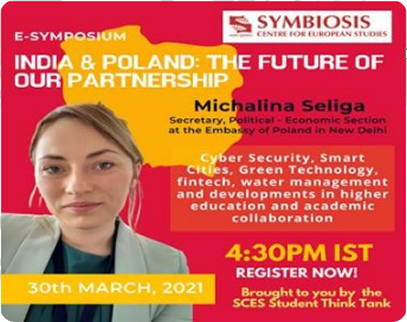
Topic: India and Poland: The Future of our Partnership
Date:30th March 2021
As an International Cell activity, the students of the International Cell were made to attend an e- Symposium organised by the Symbiosis Centre for European Studies (SCES) Student Think Tank. The session was conducted by Michalina Seliga, Secretary in the Political-Economic Section at the Embassy of Poland in New Delhi. India and Poland have had a long history of diplomatic ties starting in 1954, sharing common ideologies based on their opposition to colonialism, imperialism and racism. India and Poland over the years, have had good exchanges at levels of heads of state and the respective governments. Poland is India’s largest trade partner and export destination in the East European region, with growing bilateral trade. This webinar is to serve as an introduction to this partnership, and future scope for cooperation for the public, especially students who will go on work in these spaces. The e-symposium addressed cooperation in Cyber Security, Smart cities, Green Technology, Fintech, Water management and Developments in Higher Education and Academic Collaboration.

Mr. Thomas Grund, Prof. Thomas Grund delivered a lecture on “Corruption Scandal and the actual investigation.” Prof. Thomas Grund is an Associate Professor at University College Dublin, Ireland. Having a strong background in Sociology, he spoke about public criminal trials and the sociological relations. He summed up that the whole is more than the sum of its parts in sociology.

Dr. Hartmut Aden, Professor of German and European Public Law, Public Policy and Public Administration, Berlin School of Law and Economics (BSEL), Dr. Hartmut Aden visited SLSP between 7th March, 2019 and 16th March, 2019. He delivered lectures to the students enrolled for the European Union Legal Studies course, and conducted a seminar for the faculty. Dr. Aden also shared with the students the opportunities for LL.M. and Summer School Exchange in BSEL.
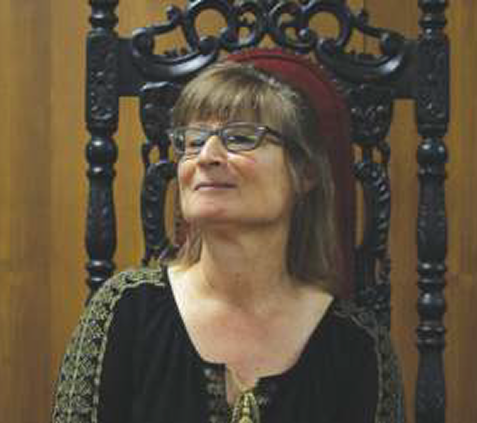
Professor Mimi Samuel Professor Mimi Samuel is an Associate Professor at School of Law, Seattle University. Her visit to Symbiosis Law School was to provide orientation about moot court to students. She elucidated that thinking like a lawyer involves three things; Firstly, analyzing statutes and cases, secondly, applying law to fact in order to construct legal arguments and thirdly, evaluating the strength of legal arguments.
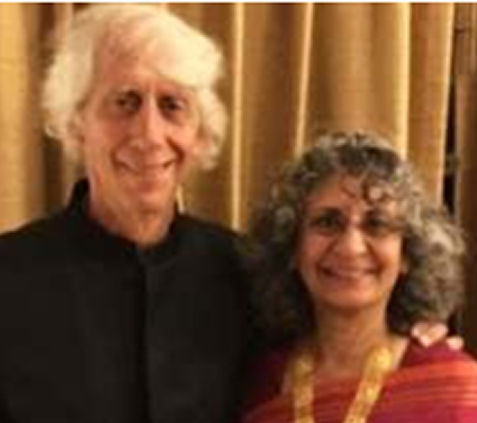
Mr. Michael Horwitz, Assistant District Attorney, Israel, strongvisited Symbiosis Law School, Pune between 25th February - 4th March, 2019. He delivered lectures for the European Union Legal Studies and Asian Legal Studies Programmes, and a Faculty Development Seminar during his stay.

Prof. Paul Babie, Dean of Adelaide Law School, visited Symbiosis Law School, Pune on 29th February, 2019. He delivered a guest lecture on 'Law and Religious Freedom.' His extensive research findings on law and religion engaged the audience thoroughly during the European Union Legal Studies Programme.

Dr. Maria Stoicheva, Professor, Functional Rector, Sofia University, came on a visit to Symbiosis Law School, Pune from 28th February to 6th March. She delivered lectures for the EULS students and also contributed to the curriculum development of the programme.

Justice Mohan Pieris, Former Attorney General of Sri-Lanka visited Symbiosis Law School, Pune from the 27th of March 2019 to the 30th of March. He judged the final rounds of Symbiosis International Criminal Trial Advocacy, 2019 and delivered lectures for the European Legal Studies and Asian Legal Studies Programmes.
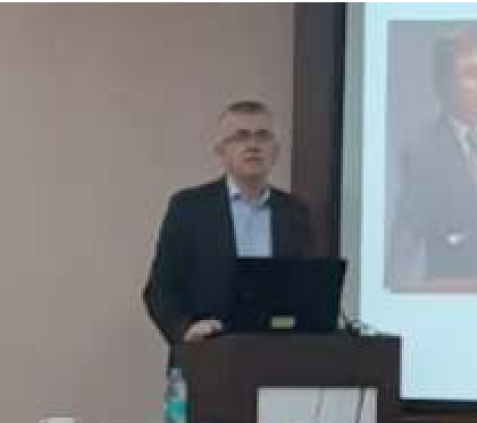
Dr. Darius Whelan, Senior Lecturer, University College Cork, School of Law, Ireland visited Symbiosis Law School, Pune from 24th April to 2nd May, 2019. With his expertise and experience in the field of research and development, he engaged Faculty Seminars, reviewed Curricula related to EURASIA project.
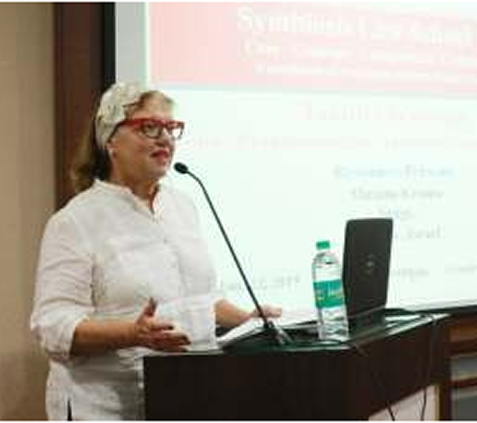
Judge Miriam Krause, Tel Aviv, Israel visited Symbiosis Law School between 17th to 24th January. She delivered various lectures on European Union Legal Studies and Asian Legal Studies and conducted a faculty development seminar during her visit. She was able to wonderfully connect with the audience by sharing her mother's experience of the holocaust. She also touched issues international justice.

Dr. Alexander Fischer, Associate Professor and Associate Dean (Research), Executive Director, Centre for Public Law and Jurisprudence, Jindal Global Law School, Sonipat visited Symbiosis Law School, Pune from the 29th March to the 1st April 2019. He judged the final rounds of the Symbiosis International Criminal Trial Advocacy Competition and delivered EULS lectures.
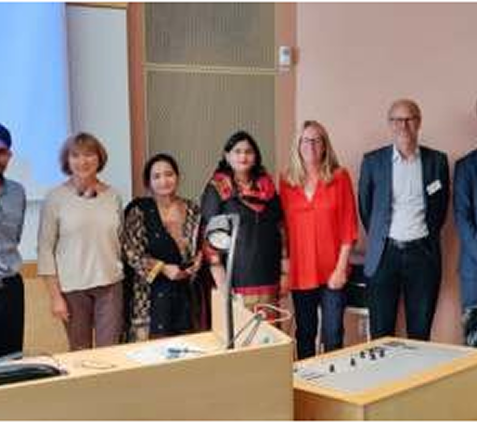
Dr. Aparajita Mohanty, Prof. Sujata Arya and Prof. KshitijNaikade attended and participated in the Workshop on European Legal Studies at Stockholm University, Sweden on 21st and 22nd. They presented a research paper titled, "Menace of Plastic Pollution: Responses from India and EU.”
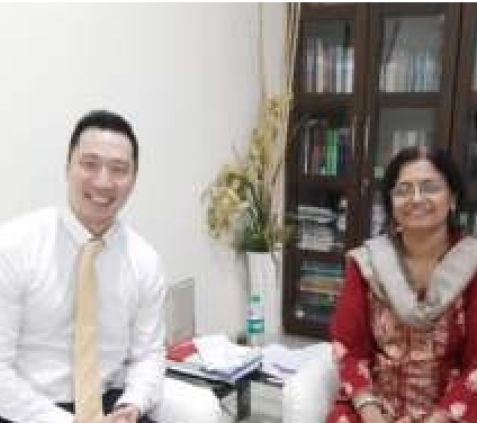
Mr. Edward Choi a Doctoral Candidate from Boston University visited Symbiosis Law School, Pune on 9th April, 2019 to interact with Dr. Shashikala Gurpuron Higher Education and Law.
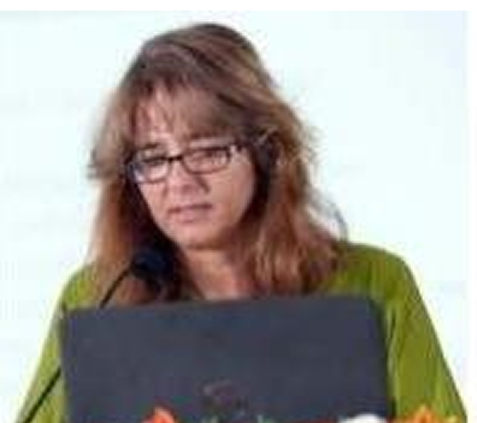
Dr. Galina Rousseva- Sokolova from Sofia University came to Symbiosis Law School, Pune on 27th April, 2018 to further the discussion on the Eurasia Project and participated in the panel discussion on EURASIA—Common Challenges and Converging Perspectives: Rule of Law in Europe and Asia.
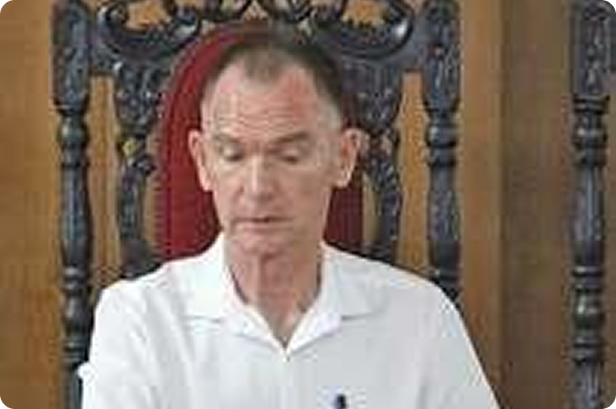
Prof. Lindsay Trotman visited SLS-P as a Scholar- in Residence. During his stay he delivered lectures on wide ranging issues like Comparative Corporate Law, Consumer Protection, Law of Torts and Comparative Constitution. He also engaged a Faculty Development Seminar on Misleading or Deceptive Conduct.
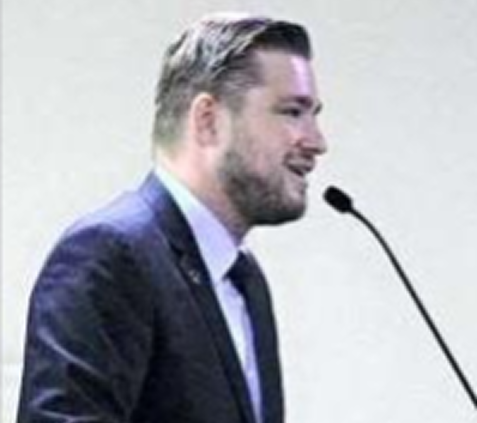
Mr. Vincent Oeters, Marketing Head- Asia and Middle East, Brill Publishers conducted a guest lecture on “How to Publish with an International Law Publisher”. He stated the importance of citations and the fundamental principles that a researcher must abide by while formulating his or her article.
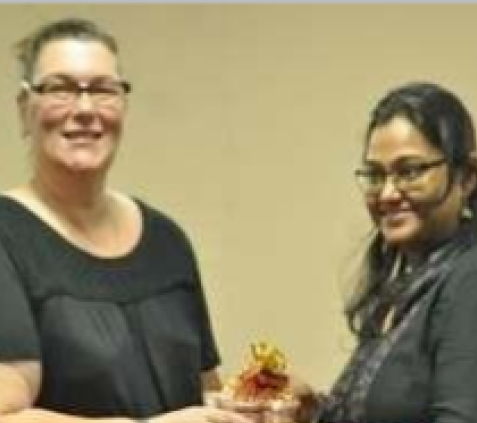
Ms. Heather Wallick,former Assistant Director of Admissions and Financial Aid at Harvard Law School conducted a guest lecture on ‘Higher Education Abroad-Admissions and Financial Aid’ on 8th September in the Professional Development and Continuing Legal Education Hall of Symbiosis Law School, Pune. She stated how students must make informed decisions about their higher education degrees.

Attorney Rebecca Todd visited Symbiosis Law School, Pune from 14th September 2018- 1st October 2018. She imparted extensive training on Mooting Skills and Legal Writing to the students of Symbiosis Law School, Pune and Symbiosis Law School, Hyderabad. She also delivered guest lectures on First Amendment Rights under US Constitution and related cases pertaining to Public Schools to the students of 5th Year BA/BBALLB, ‘First Amendment Rights, Religion and Education’ to the students of LL.M. She also conducted an intensive Legal Skills Workshop on 26th and 27th September 2018.

Prof. Stephen Barnes from Penn State University, the USA visited Symbiosis Law School, Pune on 13th September, 2018. He conducted a lecture on Constitutional Law for the LL.M and the 5th year students and a separate session for students who were interested in pursuing LL.M at Penn.
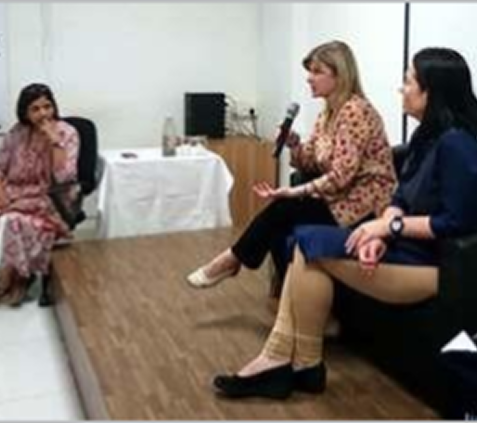
Dr. Natasaza Styczynka Assistant Professor at the Institute of European Studies Dean’s Proxy for Internationalization at the faculty of International and Political Studies Jagiellonian University and Dr. Daniela Irrera, Assistant Professor of International Relations and Global Civil Society & ERASMUS Coordinator, Department of Political and Social Science University of Catania visited SLS, Pune from 25th September to 29th September 2018 under the Erasmus+ Capacity Building in Higher participating in the panel discussion on EURASIA — Common Challenges and Converging Perspectives: Rule of Law in Europe and Asia.
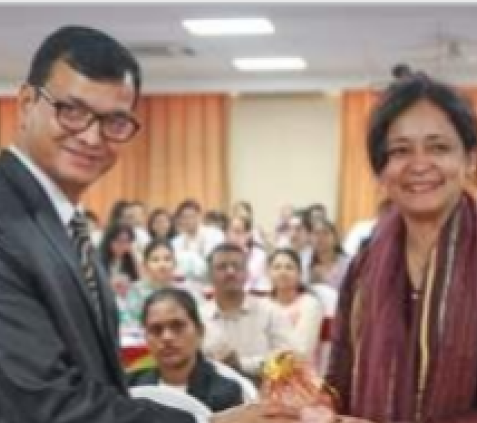
Prof. Dr. Clemens Arzt,from Berlin School of Economics & Law attended the 7th International Annual Research Conference on Rule of Law in Context: Indian and Global Perspectives from 27th, 28th and 29th September 2018 where he presented a paper on the “Rule of Law and Police in India, Namibia and Germany - A comparative approach.

A delegation from Bristol University consisting of Professor Ken Oliphant (Head of the Bristol Law School) and Mr. Dominic Freda (Faculty Manager for Social Sciences and Law) visited Symbiosis Law School, Pune on 29th November, 2018 to discuss the possibilities of collaboration for Joint Summer Schools, Law Clinic Exchange, Semester Exchange for Students, Faculty Exchange Programmes and for Lectures via video-conferencing and Skype.
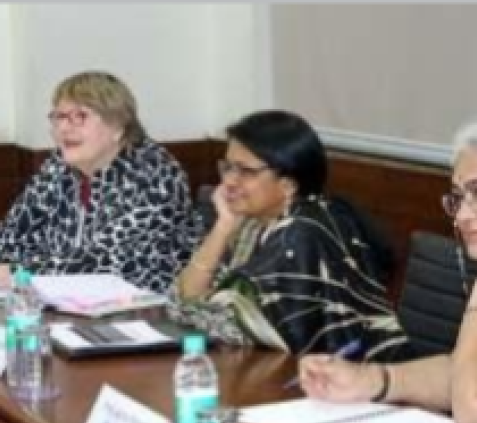
Dr. Jane Knight, Adjunct Professor of Leadership, Higher and Adult Education at Ontario Institute for Studies in Education, University of Toronto visited SLS-P on 26th December. She had a meeting with the Director Dr. Shashikala Gurpur and faculty members of the Law School. Being a renowned scholar of the eld of internationalization of higher education, the discussion veered around the following:

European Studies Revitalized Across Asian Universities (EURASIA) Project EURASIA is a capacity building project in higher education aimed at strengthening the academic ties between higher-educational institutions (HEI) in 4 program countries (Bulgaria, Poland, France and Italy) and 4 HEIs from 2 partner countries (China and India).The main coordinating University is Sofia University, Bulgaria. Symbiosis Law School, Pune (SIU) has achieved another milestone in promoting internationalization by being a part of the prestigious Erasmus Capacity Building Project.
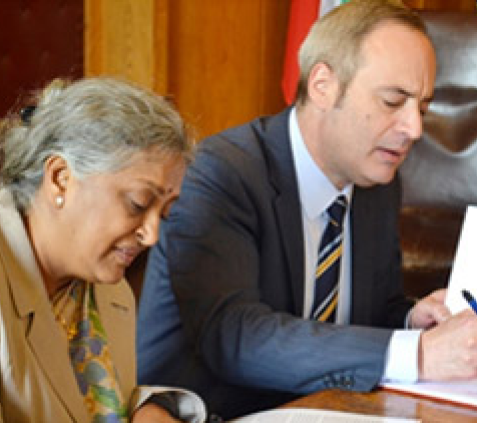
The European Union’s Erasmus+ Programme is a funding scheme to support activities in the fields of education and training and the project activities would include the elaboration of original, innovative and methodologically grounded modules and courses on European Studies, upgrade and modernization of existing courses and developing unique ones addressing regional cooperation which will promote stronger ties between India and Europe and contribute towards knowledge generation, dissemination and cross-cultural sensitization.
30th March 2018 – 6th April 2018, Dr. Radley Henrico, Senior Lecturer, Public and Procedural Law, Faculty of Law, University of Johannesburg, Advocate of The High Court of South Africa visited SLS-P. He delivered lectures on

Understanding the concept of “religion” within the constitutional guarantee of religious freedom’ to 1st Year BA/BBA LLB and LLM students of SLS-P.
Constitutional Law: The limits of transformative constitutionalism with reference to the doctrine of separation of powers / Mutual accommodation of religious differences in the workplace – a jostling of rights to 2nd Year- BA/BBA LLB & 1st Year LLB students of SLS-P.
Limits of the rule of law: ethical duties to be assumed by persons in public office to prevent corruption’ to LLM and 2nd Year LLB students of SLS-P.
Introductory Principles to South African Constitutional Law &South African Administrative Law: The relevance of the principle of legality’to LLM students.
Educating our future legal practitioners: The imperative of transformative education’ to 5th Year BA/BBA LLB & 3rd Year LLB students of SLS-P.
Faculty Seminar on ‘Understanding the concept of “religion” within the constitutional guarantee of religious freedom.
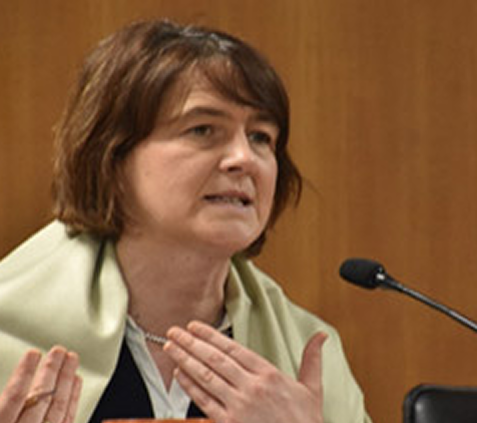
25th-27th March 2018, Dr. Siobhan Mullally, Commissioner, Irish Human RightsCommission judged the SICTA Finals and delivered lectures on: Camp for quality enhancement of Dissertation’ for LLM students on 29th March 2018.Faculty Seminar on “Council of Europe: Human Rights monitoring on Trafficking of Human Beings
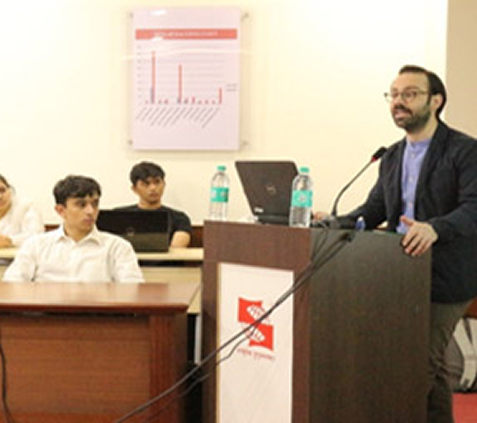
Dr. Federico LupoPasini, Professor, Faculty of Law, Queens University, Belfast delivered a lecture on ‘Implications of BREXIT from the perspective of International Business Laws’ for the students of 4th and 5th Year BA/BBA-LLB on 19th February 2018.

Dr. Christiane Trüe, Professor of Public Law, Faculty of Law and Economics, Bremen University of Applied Science, Germany and Prof. Dr.MechthildSchrooten, Faculty of Law and Economics, Bremen University of Applied Science, Germany delivered a lecture on Overview of European Union Environmental Law on 22nd February 2018.
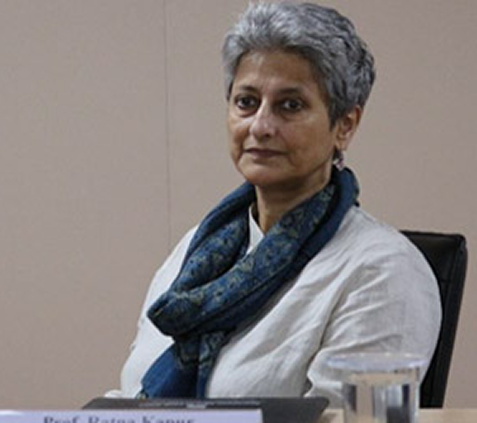
Dr. Ratna Kapur, Visiting Professor, School of Law, Queen Mary University of LondonguidedLL.M. Human Rights students on their research topics.She also delivered a discourse on ‘EU and European Court of Human Rights’ on 12th March, 2018 for the students of Certificate Program, Spring School of EULS and 4th& 5th Year students of B.A.-B.B.A.-LL.B. She also delivered a lecture on ‘Camp 1- (External Expert) for Human Rights Students’ on 13th March, 2018 for LLM Human Rights students.

12th - 13th January, 2017, Mr. Chris Parsons,Chairman, India Practice, Herbert Smith Freehills LLP visited SLS, Pune. He delivered a guest lecture on Cross-border Mergers and Acquisitions – the India Story to the students of IV, V Year BA. LL.B./ B.B.A. LL.B., III Year LL.B., and members of the Community Legal Care Centre. He also spoke about his 30 marathons over 30 days in India for uplifting the condition of disadvantaged women.

5th January, 2017, Prof. J.R. Swanegan, Assistant Dean, International Programs at Stetson University College of Law, Tampa Bay, Florida and Prof. Royal Gardner, Faculty of Environmental Law, Stetson University College of Law in Tampa Bay, Florida visited SLS-P.
During their stay, they discussed possibilities of future collaborations with SLS,Pune.

12th January, 2017, Prof. William (Bill) Cushley, International Dean for Eurasia and South Asia and Mr. Sanju Dominic , International Officer (India) visited SLS, Pune and discussed prospects of future collaboration in the areas of Research, Joint Publication and Joint Summer School in the field of IPR, participation in the two International Moot Courts and the Annual Research Conference.

13th January, 2017 ,Prof. Dario Moura Vicente13th January, 2017, Professor, Faculty of Law, University of Lisbon, President of the Institute for Legal Cooperation, Lisbon paid a visit to SLS, Pune during which he discussed the possibility of an MOU with SLS, Pune with the International Cell.

9th February, 2017, Dr. Ilias Trispiotis of the School of Law from University of Leeds delivered a lecture on the 'Significance of the European Court of Human Rights in a Globalizing World' for the LLM students of SLS, Pune.

15th - 16th February, 2017, Prof. Margaret Sova McCabe, Associate Dean for Academic Affairs, Professor of Law, University of New Hampshire School of Law visited SLS, Pune. During her visit, she conducted a Faculty Seminar on 'Framework for Approval of Genetically Engineered Crops Inadequately Prepare for Deregulation.' She also introduced students to the Franklin Pierce IPR Centre and UNH.

Mr. Matti Gurreck Scientific Assistant, Chair of Public Law-European Law, Leibniz University, Hannover, Germany visited SLS-P from 12th - 27th February, 2017. During his stay, he delivered lectures to the EULS Certificate Course students and conducted FDP on 'Soft Law in EU'.

10th February, 2017, Prof. Elaine Claar Campbell, Director of Graduate and International Programs, Peking University School of Transnational Law ("STL"), Shenzhen, China and Professor Ray Campbell, Peking University School of Transnational Law visited SLS-P. They introduced STL and their LL.M. degree program.
Prof. Ray Campbell delivered a lecture on 'How the Digital Age is Impacting the Practice of Law' to the students of BA/BBALLB IV Year and II & III Year LLB.

24th February, 2017, Helen Hudson, Head of Legal Development, Nottingham Trent University visited SLS-P and discussed future possibilities of collaboration, online courses and summer schools.

28th February, 2017, Dr. Anja Meutsch, Cologne University visited SLS-P. She conducted a lecture for the European Union Legal Studies Certificate Course offered by SLS, Pune.
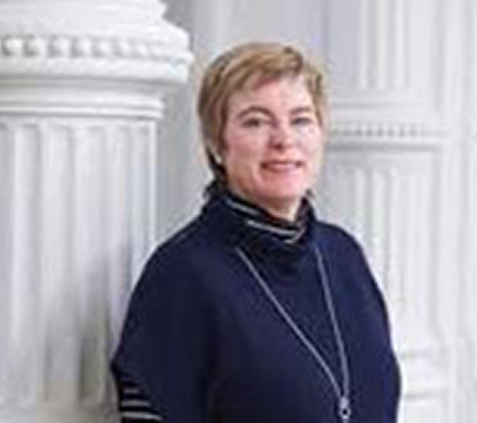
2nd March, 2017, Hon'ble Justice Mohan Peiris, Former Chief Justice and Attorney General, Sri Lanka delivered a guest lecture on 'Judicial Review: A comparison of India, Sri Lanka and USA' for BA/BBALLB (Hons.) II Year.
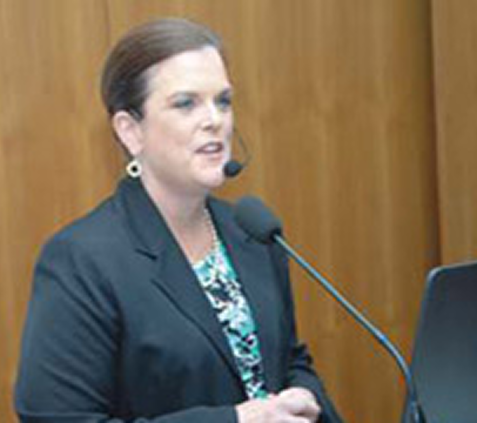
Hon'ble Justice Kristi Lea Harrington, Judge, South Carolina State Circuit Court, State of South Carolina, USA visited SLS, Pune, India from 20th June, 2016 to 24th July, 2016 as a Fulbright Scholar for guest lectures, faculty seminars and conducted a Workshop on 'Judging and Judicial Training: Best Practices' on 9th July, 2016 as the resource person for 45 judges of Pune District Court.
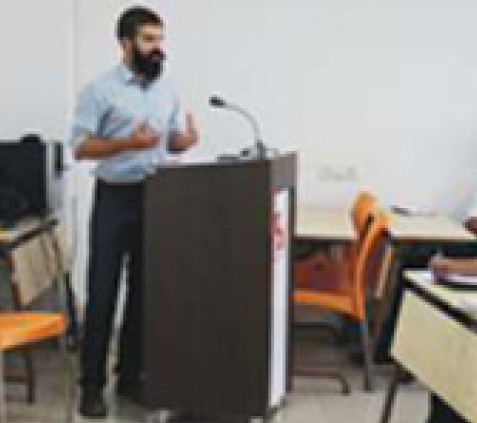
Mr. Dawid Stanczak, PhD candidate - School of Criminology, Politics and Social Policy, Jordans town, New town abbey, County Antrim Ulster University, UK visited SLS, Pune from 5th August, 2016 to 5th October, 2016. During his visit, he undertook lectures for UG students at SLS, Pune. Further, he undertook writing joint research paper with Director, Dr. Shashikala Gurpur.
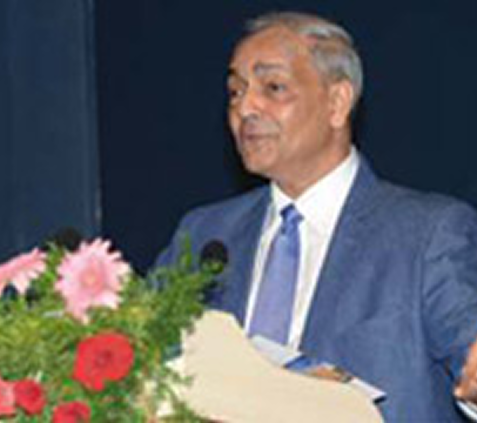
Hon'ble Justice Mohan Pieris, Former Chief Justice of Sri Lanka, visited SLS,P from 20th August to 28th August, 2016. During his stay, he conducted multiple lectures for under graduate and post graduate students. Further, he conducted a faculty seminar and a capsule course on arbitration.
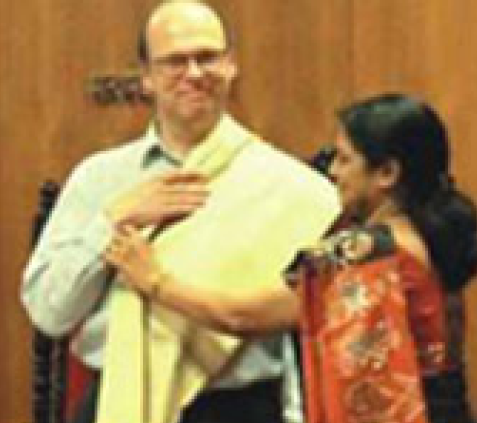
Prof. Kris Gledhill , AUT Law School, New Zealand visited SLS, Pune as the plenary speaker for the Annual Research National Conference held at SLS, Pune on 10th and 11th September, 2016.

Prof. Renate Kock from Cologne University, Germany visited SLS, P on 26th and 27th September, 2016 in furtherance of her research on Right to Education in Maharashtra schools: A comparative critique with reference to Germany along with Director, Dr. Shashikala Gurpur, SLS, Pune.
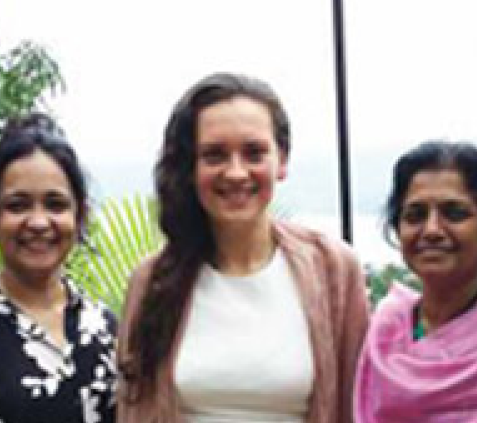
Ms. Claudia Kurkin, Faculty of Law-Brunswick European Law School (BELS), Germany visited SLS, Pune from 22nd to 30th September, 2016. During her stay, she conducted multiple lectures for under graduate students and also conducted a faculty seminar for SLS, P faculty.
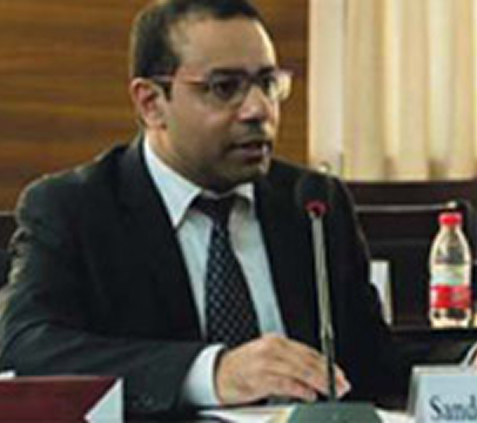
Prof. Sandeep Gopalan, Dean, Deakin University Australia visited SLS, P on 4th October, 2016 where he addressed LLM & BA/BBALLB III Year (Hons.) students in the area of corporate laws.
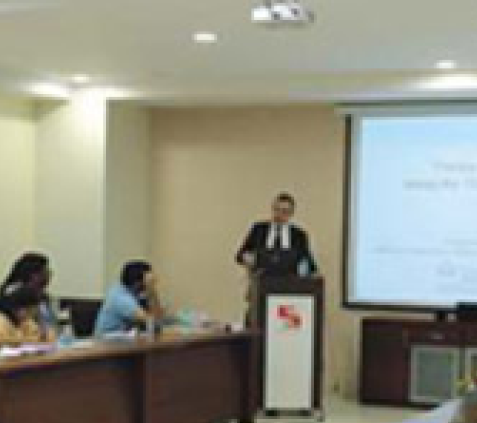
Prof. Ian Walden, Professor of Information and Communications Law and Head of the Institute of Computer and Mr. Patrick Power, Deputy Director, Marketing and Communications at Queen Mary, University of London visited SLS, Pune on 9th November, 2016 for discussing further collaboration between both the institutes.
Prof. Ian engaged a lecture for the faculty members of SLS, P on Privacy and Security during the War on terrorism on 9th November, 2016.

Prof. Stephen Barnes, Assistant Dean for Graduate and International Programs visited SLS, Pune on 22nd September, 2016. MOU between SLS, P and Penn State Law was exchanged.
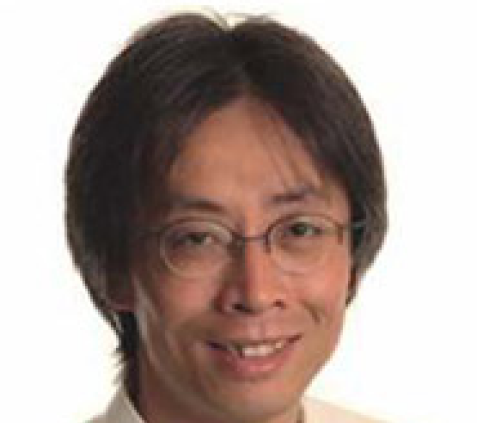
Dr. Nicolas Kang-Riou, Lecturer, Salford Law, Salford Business School, Salford, Manchester UK visited SLS, P on 5th December, 2016 and met Dr. Bindu Ronald and other faculty members for discussing collaborations and exploring areas of joint research and funding.

Prof. Chris Guthrie, Dean, Vanderbilt Law School, Prof. Yesha Yadav, Vanderbilt Law School and Ms. Cynthia Coleman met Dr. Gurpur on 12th December, 2016 for exploring possibilities of exchange and prospects of doing LL.M at Vanderbilt.
International Visiting Faculty
January 2017 – August 2019
| Sr No. | Name | Duration | Task Undertaken |
|---|---|---|---|
| 1 | Prof. Swanegan
Assistant Dean of International Programs at Stetson University, College of Law Tampa Bay, Florida. Prof. Royal Gardner-Faculty of Environmental Law |
05th Jan, 2017 | Discussion with Director Ma’am for future possibilities of collaboration.One guest lecture by DR. Gardner on environmental law, Wetland Law and Policy. |
| 2 | Chris Parsons
Chairman, India Practice, Herbert Smith Freehills LLP |
05th Jan, 2017 | Guest lecture-corporate law matters and negotiating skills |
| 3 | Prof. William (Bill) Cushley,
International Dean for Eurasia and South Asia Mr. Sanju Dominic, InternationalOfficer (India) |
12th January 2017 | |
| 4 | Dario Moura,
Vicente Professor Faculty of Law University of Lisbon President of the Institute for Legal Cooperation Lisbon |
January 13 | Guest Lecture on Comparative Contract Law |
| 5 | Dr Ilias Trispiotis,
School of Law from University of Leeds. |
9th Feb, 2017 | Guest lecture on European human rights, interaction with students on future career prospects, meeting with Director madam and faculty for research collaboration. |
| 6 | Margaret Sova McCabe,
Associate Dean for Academic Affairs, Professor |
15th, 16th Feb 2017 | Meeting with the Director Dr. Shashikala Gurpur, Student and Faculty Seminar on IP-related lecture addressing the intersection of IPRs and Social Justice in the Global Food System.
Information to the students regarding UNH Law’s programs, the application process for international students, the visiting scholar program, and other features of new institutional relationship. |
| 7 | Prof. Ray Campbell | 10th Feb,2017 | Guest Lecture: Future of Law in a Digital Age |
| 8 | Mr. Matti Gurreck
Leibniz University, Hannover Germany |
12th to the 27th February 2107 | Lectures for EULS Course |
| 9 | Helen Hudson
Head of legal Development Nottingham Trent University |
24th Feb 2017 | Discussion with Director ma’am and International cell for future possibilities of collaboration, online courses and summer schools |
| 10 | Dr. Anja Meutsch,
Cologne University |
28th Feb 2017 | European Union Law & Effect of Brexit on EU' |
| 11 | Ms. Sandra Duffy
IRC Postgraduate Scholar NUI EJ Phelan Fellow in International Law, PhD candidate |
27th March 2017 to 1st April 2017 | Lectures on European Convention on Human Rights and examples of its effects on domestic legal systems”
FDP on Human Rights and Ireland Attended the inaugural function of Symbiosis International Criminal Trial Advocacy Competition |
| 12 | Michael Horowitz | ||
| 13 | Dr. John Tingle
Nottingham Trent University |
27th March 2017 to 1st April 2017 | SYMHEALTH and Summer School on 4th to 12th May 2017 Medical Law, Patient Safety and Ethics: Contemporary Issues" starting from May 8 to May 13, 2017. |
| 14 | Dr. Linda Gibson | ||
| 15 | Ms Amanda Cattini | ||
| 16 | Dr. Kris Gledhill
AUT, New Zealand |
4th to 12th May 2017 | SYMHEALTH and Summer School on 4th to 12th May 2017 Medical Law, Patient Safety and Ethics: Contemporary Issues" starting from May 8 to May 13, 2017. |
| 17 | Rebecca Todd
Scholar in Residence, Antioch University, USA |
13th July 2017- 3rd Aug 2017 | Conducted Moot court training for fresher students.
Teaching legal skills and advocacy |
| 18 | Hon. Justice Mohan Pieris | 27th Aug to 29th Aug 2017 | Conducted workshop on Constitutional Law workshop on Negotiation |
| 19 | Prof. Kris Gledhill
AUT Law School, New Zealand |
16th & 17th September 2017 | Sixth Annual Research Conference on Contemporary Legal Scholarship cum Legal Research Skills Training Workshop to be held on 16th & 17th September 2017 |
| 20 | Robert B. Ahdieh,K.H. Gyr, Professor of Private International Law,Vice Dean of Emory Law School | 16th-17th Sep 2017 (TENTATIVE) | Meeting at Pune with the VC/Dean and the team from Symbiosis Law School on the subject of possible collaboration of Emory Law School with Symbiosis Law School. |
| 21 | Ms Amanda Cattini | 27th March 2017 to 1st April 2017 | 27th March 2017 to 1st April 2017 |

International Criminal Law Summer School was held from 24th to the 29th of June, 2019 at National University of Ireland, Galway, Ireland. It was attended by Vikrant Sharma (First Year, BA LLB), Vasundhara Mehta (First Year, BA LLB), Aarya (First Year, BA LLB), SindhujaBirenji (First Year, BBA LLB), Manasi Desai (Second Year, BA LLB), Preetham Correa (Third Year), and Coral Shah (Third Year) under the guidance of the International Cell.
Our students with ICC Prosecutor Fatou Bensoudaat International Criminal Law Summer School
Director Dr. Shashikala Gurpur with Prof. Siobhan Mullally, Director, Irish Centre of Human Rights and the students at National University of Ireland, Galway.
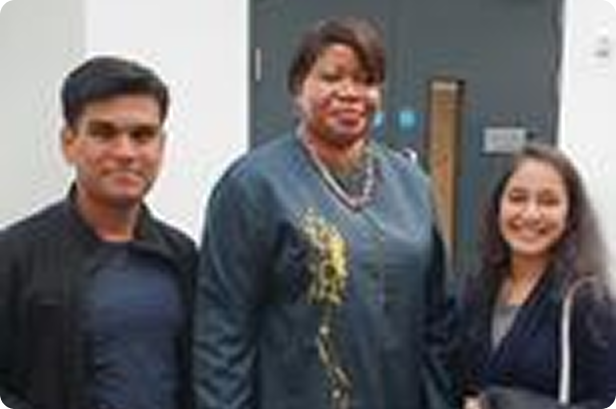
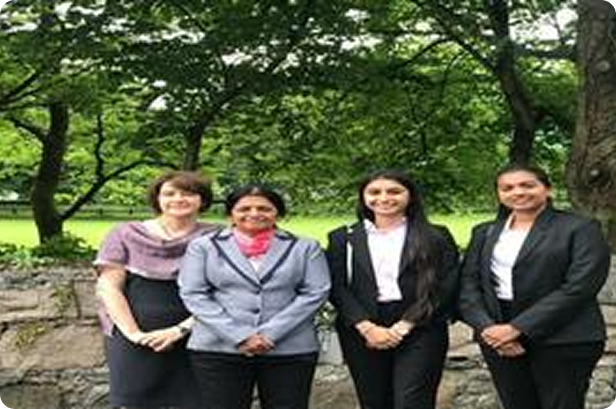
Anushka Vyas and Neelakshi Gupta at Brunswick European Legal Studies.
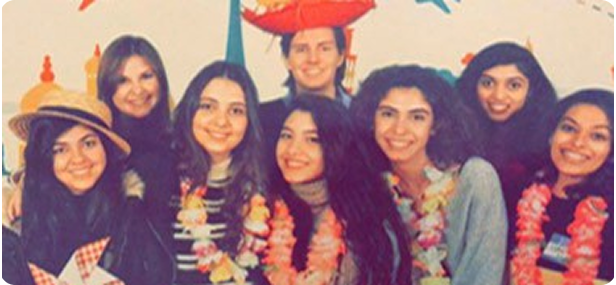
Tarini Dhar Prabhu, 3rd year BA LLB went to Université Paris-Dauphine, France from January to April, 2018 as a part of Global Immersion Programme (GIP).
Ronak Agarwal, 4th Year BBA LLB went to University College Cork, Ireland - School of Law from January to April, 2018 as a part of Global Immersion Programme (GIP).
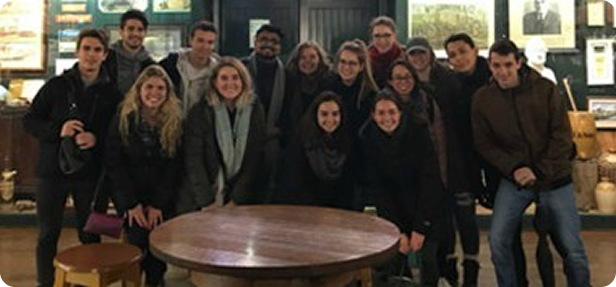
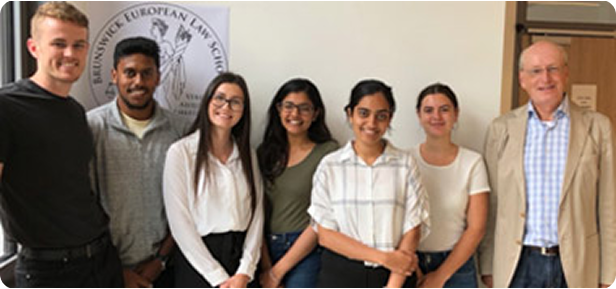
Prabhneer Swani, 3rd Year BA LLB and Khyati Lohan, IV Year BA LLB attended the Brunswick European Law School, Ostfalia University of Applied Sciences, Germany from 1st May to 30th June 2018.
Symbiosis Law School, Pune - Recent Visitors

Mr. Michael Horwitz, Assistant District Attorney, Israel, , visited Symbiosis Law School, Pune between 25th February - 4th March, 2019. He delivered lectures for the European Union Legal Studies and Asian Legal Studies Programmes, and a Faculty Development Seminar during his stay.

Prof. Paul Babie,Dean of Adelaide Law School, visited Symbiosis Law School, Pune on 29th February, 2019. He delivered a guest lecture on ‘Law and Religious Freedom.’ His extensive research findings on law and religion engaged the audience thoroughly during the European Union Legal Studies Programme

Dr. Maria Stoicheva,Professor, Functional Rector, Sofia University, came on a visit to Symbiosis Law School, Pune from 28th February to 6th March. She delivered lectures for the EULS students and also contributed to the curriculum development of the programme.

Justice Mohan Pieris, Former Attorney General of Sri-Lanka visited Symbiosis Law School, Pune from the 27th of March 2019 to the 30th of March. He judged the nal rounds of Symbiosis International Criminal Trial Advocacy, 2019 and delivered lectures for the European Legal Studies and Asian Legal Studies Programmes.

Dr. Darius Whelan , Senior Lecturer, University College Cork, School of Law, Ireland visited Symbiosis Law School, Pune from 24th April to 2nd May, 2019. With his expertise and experience in the eld of research and development, he engaged Faculty Seminars, reviewed Curricula related to EURASIA project.
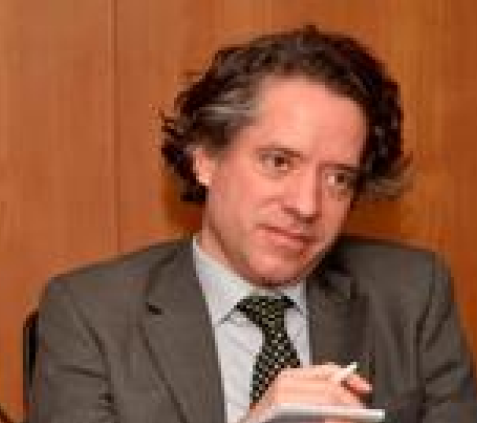
Judge Miriam Krause , Tel Aviv, Israel visited Symbiosis Law School between 17th to 24th January. She delivered various lectures on European Union Legal Studies and Asian Legal Studies and conducted a faculty development seminar during her visit. She was able to wonderfully connect with the audience by sharing her mother's experience of the holocaust. She also touched issues international justice.

Dr. Alexander Fischer , Associate Professor and Associate Dean (Research), Executive Director, Centre for Public Law and Jurisprudence, Jindal Global Law School, Sonipat visited Symbiosis Law School, Pune from the 29th March to the 1st April 2019. He judged the nal rounds of the Symbiosis International Criminal Trial Advocacy Competition and delivered EULS lectures.
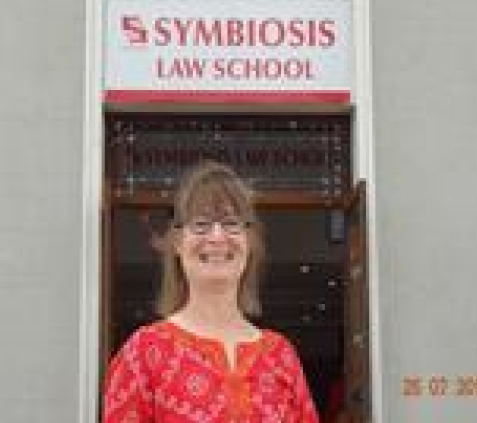
Mr. Edward Choi, a Doctoral Candidate from Boston University visited Symbiosis Law School, Pune on 9th April, 2019 to interact with Dr. Shashikala Gurpur on Higher Education and Law.

Mr. Edward Choi, a Doctoral Candidate from Boston University visited Symbiosis Law School, Pune on 9th April, 2019 to interact with Dr. Shashikala Gurpur on Higher Education and Law.

Professor Lindsay Trotman , Assistant Professor, Massey University, New Zealand visited Symbiosis Law School, Pune as a Scholar- In Residence from the 25th June to 2nd August 2019. During his stay he conducted lectures in Company Law, Competition Law, Law of Torts and Environment Law. He also conducted faculty seminars and undertook joint collaboration for Research and Publication.

Prof. Miriam Samuel, Associate Professor, Lawyering Skills & Associate Director, Legal Writing Program, Seattle University School of Law, Seattle, Washington, USA visited Symbiosis Law School, Pune, India from 5th July 2019 to 1st August 2019 as Visiting International Faculty. During this period, she undertook extensive training on Mooting Skills and Legal Writing for the students of 1st year BA / BBA LLB and LLB, lectures on Introduction to the U.S Constitution, Chevron Doctrine under Administrative Law and Lectures and Panel Discussion on the topic of Contemporary Lawyering. Prof. Mimi also undertook Training on Mooting Skills and Legal Writing for the students of Symbiosis Law School, Noida, Hyderabad and Nagpur. She also engaged a Faculty Seminar on Effective Legal Writing for law students, faculty and attorneys.

Dr. Ryan Beaton, Associate Attorney at Juristes Power, Vancouver, B.C. visited Symbiosis Law School, Pune on the 20th of July and undertook a lecture for the LL.M student on Introduction to the Canadian Constitution and a faculty seminar on the topic of Legal Pluralism and Constitutional Interpretation in Canada.

Dr. Karl Marxen of Brunswick European Law School/Ostfalia University of Applied Sciences visited SLSP from 25th to 31st Aug 2019.

A workshop on Practical Aspects of EU Funding - Proposal, Application And Academic Project Management was conducted by SLSP from 11th-14th Sept in collaboration with SCIE-SCES, SCRI and STLRC. The resource persons for this workshop were Prof. Mirko Varano, Senior Advisor International Projects, KTH Royal Institute of Technology University Administration International Relations Office and Prof. Christofer Fredriksson, Independent Consultant, International Relations Coordinator & Program Advisor, Stockholm University of Arts from Stockholm, Sweden. The workshop covered topics such as 'Basic Theory and Requirements for the EU funding', 'Budget Rules and requirements', 'Writing a successful proposal', 'Managing an approved project', etc.

A workshop on Practical Aspects of EU Funding - Proposal, Application And Academic Project Management was conducted by SLSP from 11th-14th Sept in collaboration with SCIE-SCES, SCRI and STLRC. The resource persons for this workshop were Prof. Mirko Varano, Senior Advisor International Projects, KTH Royal Institute of Technology University Administration International Relations Office and Prof. Christofer Fredriksson, Independent Consultant, International Relations Coordinator & Program Advisor, Stockholm University of Arts from Stockholm, Sweden. The workshop covered topics such as 'Basic Theory and Requirements for the EU funding', 'Budget Rules and requirements', 'Writing a successful proposal', 'Managing an approved project', etc.

Dr. Karl Marxen of Brunswick European Law School/Ostfalia University of Applied Sciences visited SLSP from 25th to 31st Aug 2019. Dr. Karl Marxen of Brunswick European Law School/Ostfalia University of Applied Sciences visited SLSP from 25th to 31st Aug 2019.

Prof. Rebecca E. Todd, University Counsel, Antioch University, conducted a guest lecture on 26th July, 2017 at 10:00 AM for the students of the 3rd Year B.B.A-LL.B. (Hons.) and B.A-LL.B. (Hons.) of Symbiosis Law School, Pune. The lecture dealt with the US Environment law and the Love Canal tragedy being at the centre of the discussion.

Justice Mohan Peiris, Former Chief Justice and Attorney General of Sri Lanka conducted a workshop on theme of ‘Constitution and Constitutionalism, Rule of Law and Judicial Review: a comparative study between U.K., India, U.S and Sri Lanka’ for the students of Symbiosis Law School, Pune on 28th August 2017. The lecture, organized for 2nd Year B.A. and B.B.A.-LL.B. (Hons.), 1st Year LL.B. and LL.M. students, commenced at 10:30 AM.

Hon’ble Justice Mohan Peiris, Former Chief Justice and Attorney General of Sri Lanka delivered a guest lecture on ‘Negotiation Tactics’ on 29th August, 2017. The lecture, organized for the 5th Year B.A. and B.B.A.-LL.B. students of Symbiosis Law School, Pune, commenced at 11:00 AM.

Symbiosis Law School, Pune organized a guest lecture by Prof. Kris Gledhill, Professor, Director of Post Graduate Programmes, Director of Clinical Legal Education, AUT Law School, Auckland, New Zealand on 20th September, 2017. The lecture, on the topic ‘Comparative Criminal Law with reference to Rule of Law’, was organized for the students of 5th Year B.A.-B.B.A.-LL.B. and commenced at 1.00 PM.
| Sr No. | Month & Year | Content |
|---|---|---|
| 1 | Jan-18 | NIL |
| 2 | Feb-18 |
HSF Oxford ILP + Masterclass by Dr. Federico Lupo Pasini
SLS-P hosted the prestigious Herbert Smith Freehills (HSF) - Oxford International Lecture Programme, 2018 (HSF-Oxford ILP) from 5th-9th February, 2018. Dr. Chris Parsons, Chairman, India Practice, Herbert Smith Freehills, London introduced the HSF-Oxford ILP to the participants. in the next four days, he explained the stages and contractual clauses of a transaction and negotiation skills with the help of the Zentac transaction and Lucy Kohl case study.Prof. Endicott spoke on great Constitutional Law cases: Rahmatullah v. Secretary of State for Defence, a landmark decision on the principle of Habeas Corpus; Entinck v. Carrington, a landmark decision on the rule of law; Hirst v. United Kingdom, a landmark decision on human rights; R (Miller) v. Secretary of State for Exiting the European Union, a landmark decision on Brexit on 1st, 2nd, 3rd and 4th day respectively conducted a masterclass for the students pursuing the certificate programme in European Union Legal Studies on 19th February 2018. The topic was "The implications of Brexit from the perspective of international business law" |
| 3 | March |
International Guests
Professor (Dr.) Siobhan Mullally, Vice Head, University of Business and Law, University College Cork, Ireland, Commissioner, Irish Human Rights and Equality Commission and Council of Europe Expert Committee. Guest of Honour; Amb. (Dr.) Gudmunder Eiriksson, Executive Director & Professor, Jindal Global Law School, Sonipat, Former Ambassador of Iceland. conducted FDP on 'Council of Europe: Human Rights monitoring on Trafficking of Human Beings' on 26/04/2018. She conducted guest lectures on Human Trafficking related topics for UG students and also conducted a Dissertation camp for LL. M. students conducted a lecture (on 12/3/2018) on European Court of Human Rights: Secularism and the Legal Challenges to the Islamic Veil Bans along with a dissertation camp for LL.M. students. Berlin School of Economics and Law delivered lectures between 12th-15th March to the students of EULS and Spring School on EU Law Practice on the topic of 'EU and Human Rights: European Convention on Human Rights and the role of the European Court of Human Rights' and 'The Prohibition of Torture, Inhuman and Degrading Treatment and Punishment with reference to the European Union' |
| 4 | Apr-18 |
Visits of Prof. John Von Doren and Dr. Henrico Radley Professor John Von Doren, Professor Emeritus, Law, Florida State University visited symbiosis law School Pune in the month of April. He conducted the following:
for 2nd year LL. B. and LL.M. students on the topic 'US Separation of Powers: Myth and Reality?' on 5th April, 2018 Dr. Henrico Radley, Senior Lecturer, Public and Procedural Law, Faculty of Law, University Of Johannesburg, Advocate of The High Court of South Africa visited SLSP between 30th March - 6th April, 2018. He conducted various guest lectures for students of BA/BBA LL.B, LL.B and LL.M. He also conducted an Dissertation camp for LL.M. students. Dr. Radley also conducted a Faculty Development Program on the topic "Understanding the concept of 'religion' within the constitutional guarantee of religious freedom" on 2nd April 2018. |
| 5 | May-18 | NIL |
| 6 | June- 18 | Arrival of Prof. Lindsay Trotman - Scholar in Residence Prof. Lindsay Trotman arrived at Symbiosis law School Pune on 21st June 2018.He will be the Scholar in Residence from 21st June till 5th September 2018. During this time he will be undertaking Research and Editorial Board work, Faculty Development Programs and Guest lectures for students. |
| 7 | Jul-18 |
Faculty Development Programe + Joint Lecture
An FDP was conducted on 3rd july 2018 on the topic 'The statutory prohibition on misleading or deceptive conduct in trade in New Zealand and Australia. The resource person was Mr. Lindsay Trotman, Scholar in residence at SLS-P. Prof. Lindsay Trottman conducted a joint lecture along with Prof. Semanti Choudhary for LLM students on 25th July, 2018. The topic of the lecture was 'Formation of a Compay: Comparison between New Zealand and India' |
| 8 | Aug-18 | NIL |
Project Title: Teacher training with specialization on life and information technology skills/21stTS
Coordinating University : University of Ioannina, Greece
Partner Organizations:
Ambitions for education are captured in Sustainable Development Goal 4 of the 2030 Agenda for Sustainable Development which aims to “ensure inclusive and equitable quality education and promote lifelong learning opportunities for all”. In a globalized and multicultural economy and society, young people’s horizons are not broad enough to operate accordingly. Challenges, such as the rapid technological advancements and new patterns of work have created a number of demands on education, making the inculcation of 21st century skills a necessity. Those skills need to be integrated in the teacher educational programs in order for the teachers to be effective in the 21st century.
The educational curriculum seems to not successfully match with the 21st century skills requirements.

 21st Teach Skills
21st Teach Skills
 Critical Thinking Skills and Collaborative Problem Solving Skills
Critical Thinking Skills and Collaborative Problem Solving Skills
 Education Technology skills
Education Technology skills
 Authentic learning tasks
Authentic learning tasks
 Optimizing Assessment for 21st century skills
Optimizing Assessment for 21st century skills
 21st Century Skills for Students being Disseminated under the Erasmus+ CBHE Project (co-funded by European Union)
21st Century Skills for Students being Disseminated under the Erasmus+ CBHE Project (co-funded by European Union)
 Study Visit to University of Ioannina, Greece (24th to 28th February 2020)
Study Visit to University of Ioannina, Greece (24th to 28th February 2020)
 Discussion with experts for module development (13th July 2020)
Discussion with experts for module development (13th July 2020)
 Workshop on Module1 - Critical Thinking Skill and Collaborative Problem-Solving Skills (17th October 2020)
Workshop on Module1 - Critical Thinking Skill and Collaborative Problem-Solving Skills (17th October 2020)
 National & International Press Coverage
National & International Press Coverage
 INFODAY
INFODAY
 Virtual visit to 21st Teach Skills Lab at SLS Pune, SIU
Virtual visit to 21st Teach Skills Lab at SLS Pune, SIU
 2nd Study Visit to SLS Pune, SIU India
2nd Study Visit to SLS Pune, SIU India
 Networking during 2nd Study Visit - SIU
Networking during 2nd Study Visit - SIU
 3rd Study Visit to RUPP, Cambodia
3rd Study Visit to RUPP, Cambodia
 4th Study visit to Chongqing, China
4th Study visit to Chongqing, China
 5th Study Visit to BV, Jaipur, India
5th Study Visit to BV, Jaipur, India
 Delivery of 21st Century Skills Educational Programme
Delivery of 21st Century Skills Educational Programme
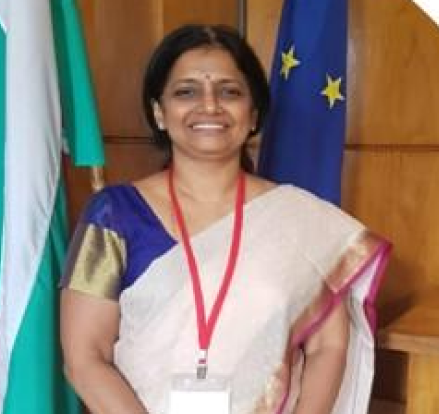
Dr. Shashikala Gurpur, Fulbright Scholar, Director, Symbiosis Law School, Pune, Dean, Faculty of Law, Symbiosis International (Deemed University), Jean Monnet Chair Professor in EU Climate Justice Law, Governance, Management and Policy
Prof. Dr. Shashikala Gurpur, Fulbright Scholar, Director, Symbiosis Law School, Pune under the aegis of Symbiosis International (Deemed University) (SIU), has been bestowed with the honour of the prestigious Jean Monnet Chair on EU Climate Justice Law, Governance, Management and Policy funded by the European Education and Culture Executive Agency of European Union under the Erasmus+ Programme with the total grant of 50000 Euros from 2022-2025.
Prof. Dr. Shashikala Gurpur is an accomplished academician, passionate researcher, toastmaster and a Fulbright Scholar, LLM topper from Mysore University, holds a Ph.D in International Law on ‘Biological Diversity Conservation Law & IP’ from University of Mysore, Karnataka. She has been the former Member of Law Commission of India. She is a recipient of the Karnataka State Government Award, Gold Medal for topping in LL.M and the AHRB Visiting Fellow, Edinburgh Law School, United Kingdom. She has an inspiring career with a wide range of impactful involvement in teaching, research, NGO and industry. Dr. Shashikala Gurpur recognised for her contribution in legal education, gender sensitization and community outreach programmes. In recognition of her contributions to the Indian legal academia, she was listed in the book ‘100 Legal Luminaries of India’ by LexisNexis.
The Jean Monnet Chair is a recognition of over a decade-long experience of Symbiosis Law School, Pune under SIU in European Studies by way of Erasmus Mundus and Erasmus+ Projects, Student Exchange Programmes, Masters Level Specialization, Certificate Programmes etc.
This is the first Jean Monnet Chair granted to any institution in Western India hence making it a glorious and remarkable milestone for SIU.
Climate Change is currently the most urgent and profoundly complex environment-related problem for the international community.
The Jean Monnet Chair on EU Climate Justice Law, Governance, Management and Policy (EU-LAMP) will foster dialogue between the academic world and society, including local and state level policy-makers, civil servants, civil society actors, representatives of the different levels of education and of the media; generate policy-making.
One of the biggest relevance that the Chair will have is the ability to influence and shape a large cohort of young students from SIU which has eight faculties ranging from Management, Telecom, Engineering, Media, International Business, and Design, apart from Law who opt for careers ranging from public service, entrepreneurship, business and industry engagement to policy, law, judiciary and government. The Chair will also indirectly impact the community at large by way of dissemination and training programmes to students of other universities in Pune.
Recognizing the importance of climate change and its impact in various aspects like food security, energy security, water security, health, migration and conflict, the central and state governments in India have made climate change a focal area. The chair will promote EU’s efforts and policies in climate change mitigation as a model for other countries seek to develop a sustainable lifestyle and eco-system thereby strengthening the role of the EU in a globalized world
The ultimate vision is to support beyond academics, through lifelong learning, the educational, professional and personal development of people in education, training, youth and sport, in the nation and beyond, thereby contributing to sustainable growth, quality jobs and social cohesion, to driving innovation, and to strengthening European identity and active citizenship.
The objective is to inculcate the experiential values to deal with the role of the EU in a globalized world to create awareness about the Union and facilitate future engagement with the people-to-people dialogue.
As a Jean Monnet Chair Professor & being pioneer of EU Legal Studies in India since 2009, the major focus of Dr. Gurpur is to build on current international academic and research excellence for young researchers to enhance their professional competencies and boost their careers. The guided leadership is reaping the fruits in the form of internationalization efforts which include European Research Grants, international collaborations, Students and Faculty Exchange.
Project Title: EU Climate Justice Law, Governance, Management and Policy
Coordinating University : University of Ioannina, Greece
Project Number:101048047
JM Chair Holder:

Climate Change is currently the most urgent and profoundly complex environment-related problem for the international community. It has a devastating impact on the planet and humankind in the form of irreversible changes to ecosystems, loss of biodiversity, rising sea levels, melting of permafrost and glaciers, desertification, droughts, floods, tsunamis, increase in global temperatures, and extreme weather conditions. While all countries will face the brunt of climate change, countries like India and many small island nations will be disproportionately affected. The impacts of climate change in India are across vital areas of food security, energy security, water security, healthcare, and migration amongst others thereby affecting the most vulnerable and resulting in the coining of the term climate apartheid. India is one of the countries, most strongly affected by climate change, ranking fifth in the GERMANWATCH Global Climate Risk Index 2020. Hence, there is an urgent need to give rigorous impetus to climate change law, governance, management, and policy in India in order to mitigate and reduce its adverse impacts. A multi-disciplinary approach is required to address and mitigate Climate Change related issues with the knowledge base of green technology, green compliances, European Green Deal among other best practices as EU and India, have committed to the Paris Agreement. In this backdrop, the Chair builds on 12-year long experience of Symbiosis Law School Pune in teaching Certificate Programme in European Legal studies, 15 years of establishing partnerships with European Universities including four prestigious Erasmus+ Projects and drawing on the strength of other Symbiosis institutes across 7 faculties and its voluminous, diverse network and robust Green Philosophy with sustainable practices. The Chair offers interdisciplinary courses and programs dealing with Climate Change, Climate Justice, Law, Policy, Governance, Green Ethics, Green Business, Sustainability, Media, and Management to influence career trajectories and enrich resources in EU climate studies.
While the EU and India are respectively the third and the fourth largest emitters of atmosphere-warming greenhouse gases, it is noteworthy to mention that in December 2019 European Commission introduced the European Green Deal which envisages climate neutrality by 2050. The EU and India have assumed a leading role in fighting climate change and have been increasingly cooperating with each other in this field, at both public- and private-sector levels.
A number of major developments have taken place in India in order to centre stage the need for combating climate change-related adversities. Recognizing the importance of climate change and its impact in various aspects like food security, energy security, water security, health, migration, and conflict, the central and state governments in India have made climate change a focal area and have dedicated departments for the same. Another major development in India is the setting up of specialized tribunals called the National Green Tribunals. These specialized environmental courts have emerged as an important defense against human-caused destruction of the environment and will eventually play a much more important role in climate-related cases in the near future. However, the competencies and capacity to respond, or to drive these initiatives are in silos.
In India, through the concept of Public Interest Litigation, the Judiciary has played an exemplary role as sentinels for the protection of the environment. Very limited lawyers or litigation teams or NGOs as actors have initiated or formulated these. Courts today are adjudicating a growing number of disputes over actions or inaction- related to climate change mitigation and adaptation efforts. The dynamic context of climate change has yet to be captured in terms of the green deal approach of the EU.
One of the biggest relevance that the Chair has is the ability to influence and shape a large cohort of about 3000 young students, from Symbiosis International (Deemed University) which has eight faculties ranging from Management, Telecom, Engineering, Media, International Business, Design, apart from Law who lands in careers ranging from public service, entrepreneurship, business, and industry engagement to policy, law, judiciary and government. This will entail having graduates who have the expertise and the domain knowledge of climate change, law, governance, management, and policy issues drawing from the EU policies.
The Chair generates interest among students to improve their competencies in terms of skill sets that enable them to work in fields of public administration and other employment positions as lawyers, teachers, researchers, advisors, representatives, analysts, or managers with local, national, international, or EU Institutional bodies present at such levels.
Innovative interdisciplinary niche courses in climate justice law, policy, management and governance will be developed across undergraduates and post graduate programs which will be open to students all over India.
The Chair generates interest among students to improve their competencies in terms of skill sets that enable them to work in fields of public administration and other employment positions as lawyers, teachers, researchers, advisors, representatives, analysts, or managers with local, national, international, or EU Institutional bodies present at such levels.
Innovative interdisciplinary niche courses in climate justice law, policy, management and governance will be developed across undergraduates and post graduate programs which will be open to students all over India.
The JM Distinguished Speaker Programme is a novel learning initiative, an exemplary undertaking of facilitating lectures of luminaries from European and Indian institutes in relevant areas of climate change policy and law for the purpose of bringing to the faculty and students the latest developments and best practices.
This Program establishes a fruitful and long-lasting collaboration between European Academics and Policy Makers and their Indian counterparts with the possibility of joint projects, publishing collaborative white papers, and preparing course material which helps in capacity building for faculty and students from Symbiosis International (Deemed University) and other institutes.
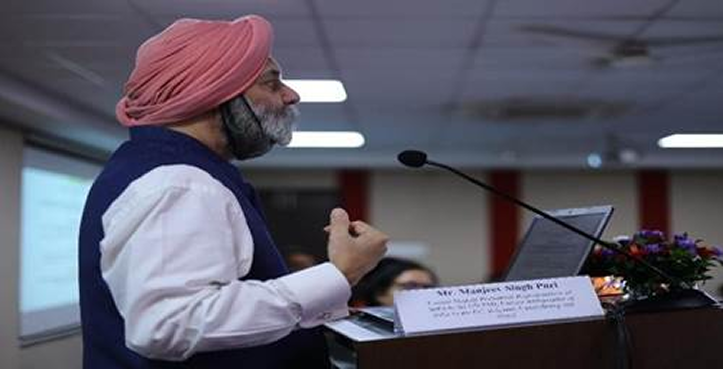
Ambassador Manjeev Singh Puri elaborating on the impact of climate negotiations in India and across the world.
Click Here To View Report
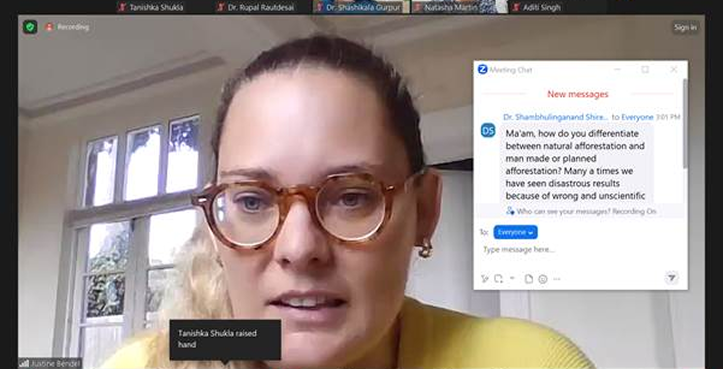
Dr. Justine Bendel addressing on ‘The role of LULUCF activities in the EU plans to regulate the accounting of GHG emissions’
Click Here To View Report
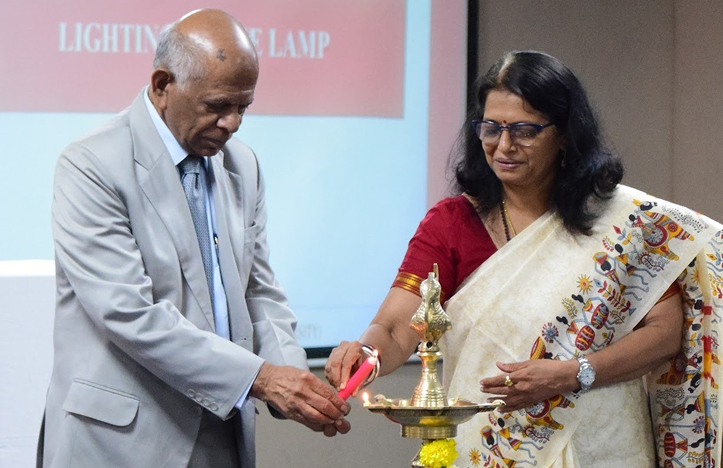
Dr. Shashikala Gurpur and Ambassador KP Fabian, lighting the auspicious lamp
Click Here To View Report
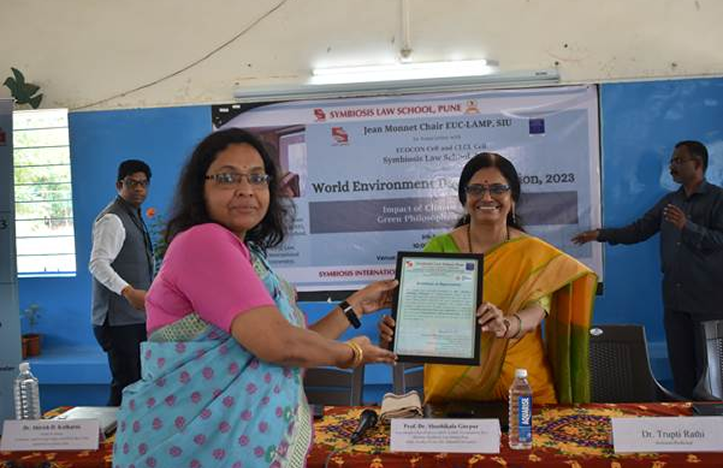
World Environment Day puts a global spotlight on the pressing environmental challenges of our times. This UN International Day has become the largest global platform for environmental outreach, with millions of people from across the world engaging to protect the planet. Under the JM Chair, World Environment Day was celebrated to create an awareness programme for the benefit of 200-300 rural school children and youth.
Prof. (Dr.) Shashikala Gurpur, Fulbright Scholar, Director, Symbiosis Law School, Pune, Dean, Faculty of Law, SIU, felicitated by Mrs. Madhura Thombare, Principal, Venkateshwara School, Taluka: Haveli, Pune on World Environment Day, 2023.
Click Here To View Report

International Mother Earth Day is celebrated on 22 April to promote harmony with nature and remind us of the importance of protecting all the different ecosystems and species on our planet. International Mother Earth Day provides an opportunity to raise global public awareness of the challenges to the well-being of the planet and all the life it supports. Under the JM Chair, SLS, Pune organized a tree plantation drive on the occasion of International Mother Earth Day in association with a local NGO and at least 100-150 participants planted trees in the western ghats of Pune. Participants taking oath to protect the Mother Earth Report of Celebration of Mother Earth Day, 2023: Click Here To View Report

Training the Trainers Programme on Climate Justice Law, Governance, Management and Policy was organized on 20th January 2024 at Symbiosis Law School, Pune (Hybrid Training – Physical presence of participants plus online participation) under the Jean Monnet Chair on EU Climate Justice Law, Governance, Management and Policy (EUC LAMP) (Co-funded by the EU) for the purpose of building capacity among teachers, NGOs, advocacy groups mainly youth, industry and government officials, with the objective to cascade the learning to different target groups to ensure multiplier effect and create a sustainable impact at the National and International Level.
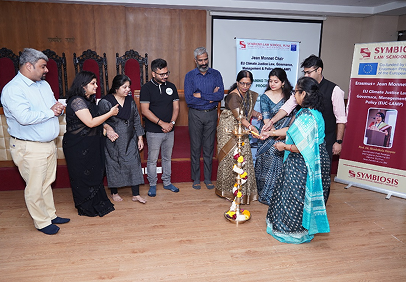
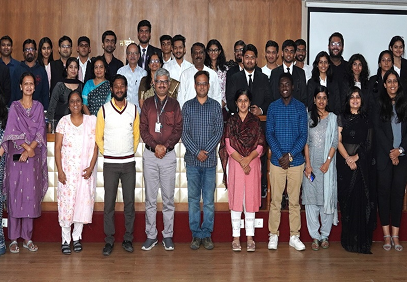
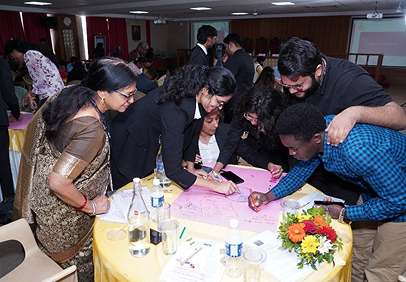

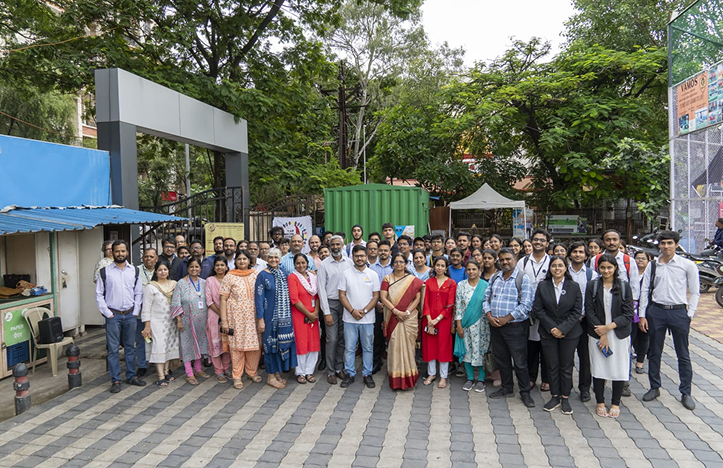
This executive workshop on ‘Climate Justice: Advancing SDG and ESG through Impactful CSR Proposal’ was organised on 15th July 2024 at SLS Pune, SIU by the Jean Monnet Chair on EU Climate Justice Law, Governance, Management and Policy (EUC LAMP) (Co-funded by the EU), Symbiosis Law School, Pune, SIU in collaboration with Shivam Singh, Founder and CEO of ExploreiT, National Coordinator for Youth, Climate Reality Project India & South Asia.
This one-day intensive workshop delved into the intersection of Corporate Social Responsibility (CSR), Sustainable Development Goals (SDGs), and Environmental, Social, and Governance (ESG) criteria. Through immersive sessions, expert guidance in workshops, and a stimulating field visit, participants learnt to draft compelling CSR proposals that align with global sustainability objectives and priorities.
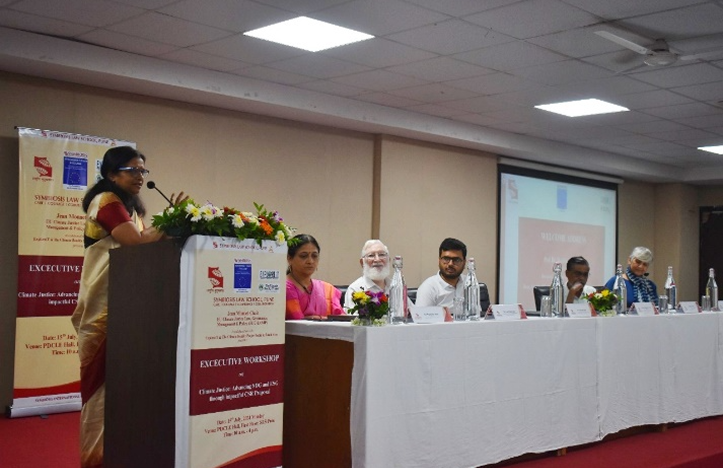
(Left) Dignitaries watering the Bilva Sampling at Executive Workshop on ‘Climate Justice: Advancing SDG and ESG through Impactful CSR Proposal’. Dr. Gurpur delivering the welcome address (Right)
Field Visit: Immersion in Impact for CSR Intervention: Guided tour to a local site with potential for CSR intervention, emphasizing SDG alignment and ESG integration led by ‘TeamSwachhKalyaniNagar’.

The Jean Monnet Chair on EU Climate Justice Law, Governance, Management & Policy (EUC-LAMP) at Symbiosis Law School, Pune, successfully concluded its Social Media Campaign through a Making Competition on International Mountain Day, December 11, 2024. The competition drew talented participants from across institutions who created compelling visual narratives around mountain ecosystems and climate change. The competition addressed crucial themes including mountain ecosystems and climate change, sustainable farming in mountain regions, impacts of commercial mining, biodiversity loss, challenges faced by mountain communities, and legal frameworks for climate justice.
We are delighted to announce the winners of this prestigious competition: Winner: Jerusha JS from The Tamil Nadu Dr Ambedkar Law University

First Runner-Up: Vartika Sahu from Allahabad University
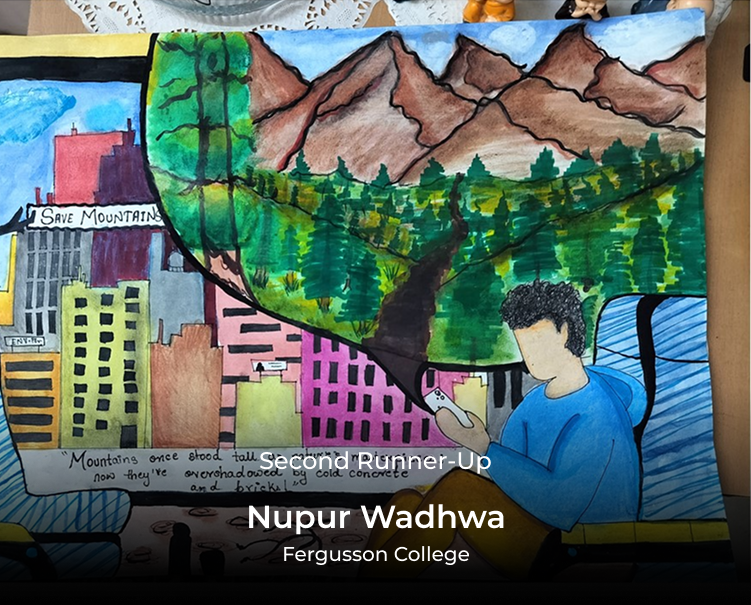
Second Runner-Up: Nupur Wadhwa from Fergusson College


At Symbiosis Law School (SLS) Pune, we pride ourselves on being a cradle of legal innovation and excellence, nurturing minds that are passionate about justice and equipped to tackle the challenges of the evolving global legal landscape.
Survey No. 227, Plot No.11, Rohan Mithila, Opp. Pune Airport, Symbiosis Road, Viman Nagar, Pune - 411014, Maharashtra

Embark on your path to becoming a legal professional who is not only skilled and knowledgeable but also ethical and compassionate.
APPLY NOWCopyright © | All rights reserved. Symbiosis Law School, Pune
Admission to all the courses and programmes at Symbiosis International University (SIU) are strictly on merit basis based on the criteria and processes prescribed by the University and assessment of individual performance in Symbiosis National Aptitude Test [SNAP] for Postgraduate Studies and Symbiosis Entrance Test [SET] for Undergraduate Studies.
All aspirants / parents are hereby notified that some individuals / organisations are giving / making false and misleading advertisements / claims in newspapers, websites, social media platforms that they can ensure admission to Symbiosis International University and also charging heavy amount for the same.
In this regard, SIU requests the aspirants / parents to refrain from entering into any transaction with such elements. SIU has not appointed any individual / agency / organisation to make such assurance on its behalf. It is a matter of Policy that SIU does not charge capitation fee for admission from students and this is widely and prominently published as well on all the relevant places like prospectus, website, SNAP Booklet, SET Booklet etc.
Despite this Notice, if any aspirant / parents still proceeds with or enters into transaction with such elements, they would be doing so at their own risk and cost. SIU further notifies that any aspirant attempting to approach SIU for admission through or at the instances of such agents will be permanently debarred from admission to all the courses and programmes at Symbiosis International University.


 21st Century Teach Skills Project
21st Century Teach Skills Project


